#as character foils. one example being their opposite views of what it means to fight for the truth as detectives
Explore tagged Tumblr posts
Note
Do you have any thoughts on how Maki will develop technique and character wise later on in the series do you think she’ll see Toji and take it has inspiration and free herself from the Zen’in or will she start to lean on others and deviate from her I’ll be strong on my own mentality
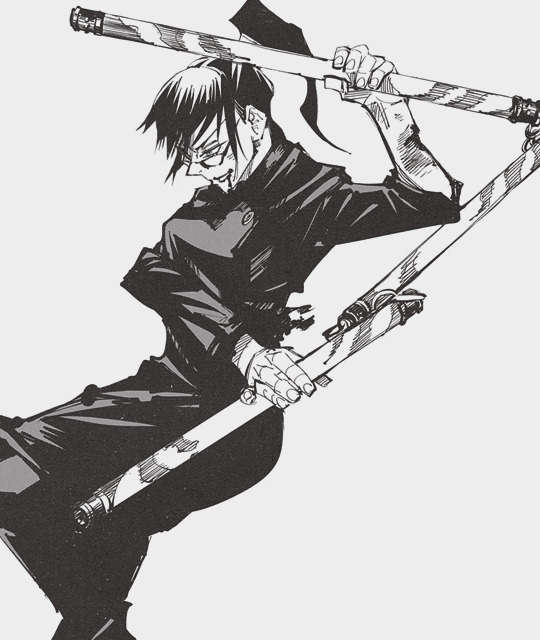
Toji is set up as a bar Maki is meant to surpass in both aspects. Toji forced himself to choose between family and his pride and regretted his choice. However, in a sense he also really didn’t choose either. He kept wavering between them. He wanted to become the strongest and cut his ties to everybody, but he still loved his son Megumi. He loved Megumi, but was unwilling to let go of his pride so he chose to neglect his responsibility as a father and push Megumi as far away from himself. Rather than choosing wrong, Toji chose indecisively, he was out of balance - he couldn’t choose one until the literal end of the line.
Which is why, Maki’s character isn’t about choosing one over the other, but finding a balance between the two. I’ll explain more under the cut.
1. Maki and Nobara are Blind
Every character in Jujutsu Kaisen has a flawed viewpoint, but that doesn’t mean they’re wrong. Rather, I prefer to think of them as “out of balance.’ Jujutsu Kaisen isn’t about black and white ideas of right or wrong but rather a multitude of different perspectives. Selfishness isn’t bad, selflessness isn’t always good. Good intentions don’t lead to good results, sometimes bad intentions can help people.
Rather than completely changing or flipping their views, because often the views that characters are hold isn’t necessarily wrong it’s much more likely they’ll be pushed to reconcile their views with the views of the other people around them. For a quick example, at the beginning of the manga, Yuji wants to save everyone, Megumi wants to seflishly choose who to save, rather than saying one or the other is wrong when Yuji hears Megumi explain himself he says that Megumi clearly put a lot of thought behind his beliefs. Rather than one of them winning over the other they come to an understanding.
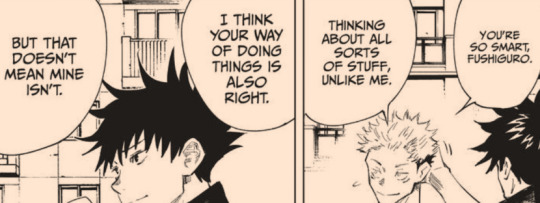
So, I think with that logic as the reason Maki will actually choose both, to free herself from the Zen’in, and also to lean on others more.
Maki’s primary character flaw comes not from really being wrong, but a lack of understnading. She doesn’t really want to integrate the viewpoints of other people into her own views.
Which makes absolute sense if you think about it, Maki is the scapegoat child of the Zen’in. She went through the same abuse Toji did, which was having everyone constantly look down at her. She was treated as a servant and an inferior to her own twin sister. It’s likely she responded the exact same way Toji did, by shutting everyone else, all their hurtful words out. Toji dealt with it by rejecting everything, both himself, and others.
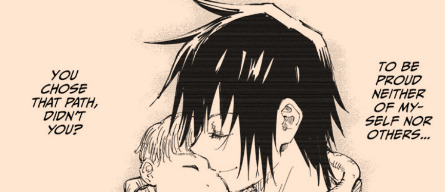
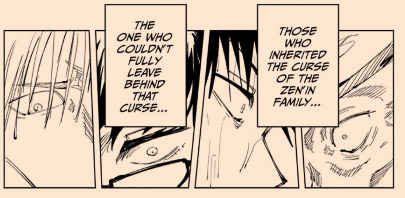

That’s why in comparison to Maki who is still struggling against the Zen’in family, and still has her life very much defined by her want to be better than them, and prove them wrong, Toji is aclled “the one who is free.”
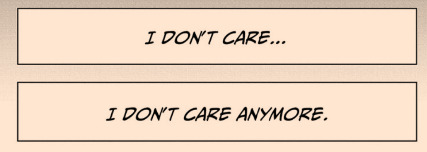
Toji’s way of coping is what Maki wants to do, which is to shut everything out and pretend she doesn’t care about anything. Only focusing on getting stronger. Maki has intenalized an unhealthy idea of what getting stronger is: not showing any weakness. Of course she has, that’s what the Zen’in household has forced into her head her entire life. Even if she escapes from the house she’s still affected by it. So then, here’s where the foiling with Nobara comes in, they both have the same tendency to shut others out, and they both tend to be blind. Nobara loses an eye, Maki is always wearing glasses.
There’s a reason the fight in the Kyoto tournament ended up being Maki and Nobara vs. Mai and Momo.
Mai is the opposite of Maki, that Maki does not want to confront. Someone who cares about family more than being a strong willed individual. Someone who admits that she wants to cling to otherse.
Momo is the opposite of Nobara that Nobara does not want to confront. Someone who is much more open about how she cares about her friends. Nobara rejects the ideas of her friends, Momo indulges them to the point where she sort of enables their bad behavior and lashing out (but that’s a different meta).

Momo is much more open about how much she cares about her classmates, (Nobara cares she’s just guarded about it) and the Kyoto group is as a whole much closer together even though they’re labeled as “weak” by mechamaru.
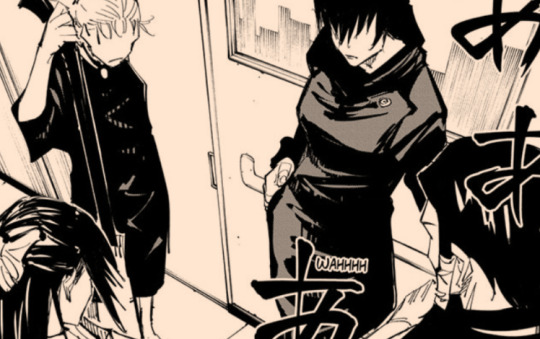
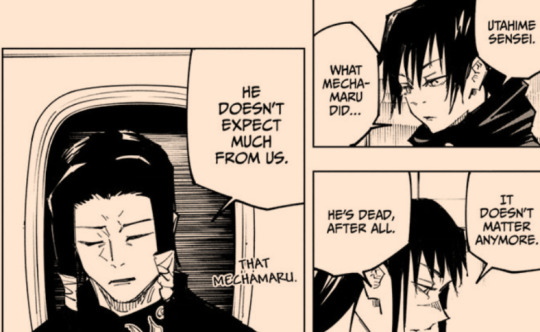
Maki sees this dependance on others as a weakness. She still does. My best guess is her development since volume zero is that she’s come around to Gojo’s line of thinking that she wants strong comrades to fight alongside her, but she still doesn’t want to expose her weakness in front of somebody else. I don’t think Maki could ever openly cry in front of others the way Miwa can for example.
Mai and Maki are two opposite extremes that need to be reconciled, Maki is independent, and Mai too codependent on her sister. We see the effects of Mai’s lashing out, but also I think it’s just important to understand the reasoning for Mai’s lashing out, Maki doesn’t really understand her own sister, what she’s going through, or how she feels.
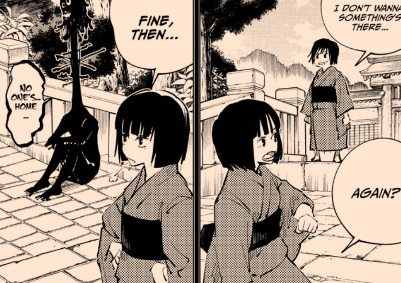

It’s even in the flashback. We see Maki bravely walking past the curse, and Mai timid and afraid of it. However, the difference is Mai can see the scary curse in front of her, and Maki can’t. So of course it’s easier for Maki to charge fully ahead.
Maki wears glasses all the time. Her vision in impaired. She can’t see cursed spirits without them. Symbolically, Maki is blind the same way Nobara is. There’s even more parallels in their backstories, they both come from environments where they had to shut everyone else out because they never really wanted to be at home. For some reason or another, they never feel home at the place that was supposed to be their home.
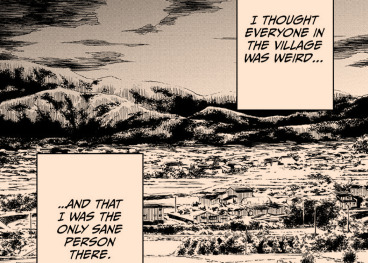
They both live in complete rejection of the place they come from, while at the same time sort of being defined by it. Maki is still very much tied to the Zen’in clan, and Nobara is closeminded in her own way like the rest of the closeminded villagers she hated. Your environment effects who you are whether you want it to or not. They also think having left their own homes, they can’t really find any home anywhere else, except for within themselves. Which is why they don’t let people in.
Which is also why we see the same consequences for Nobara and Maki they are, they keep getting blindsided. Nobara’s consequences come from not listening to people who have her best interest at heart: Nanami telling her to stay behind. As a result of not listening to him, she loses her eye in the fight against Mahito (symbolism).
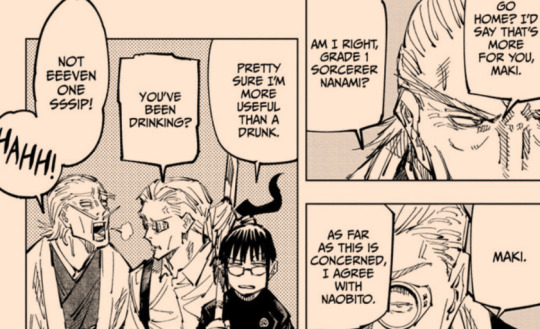
Maki tries to do what she always does which is prove that she’s stronger than the anyone else in the Zen’in household, only for this to fail. Maki not only doesn’t contribute much to the fight, she actively gets in the way, and has to be saved by Naobito, somebody she hates.
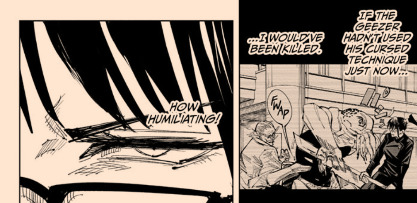
Every strategy that Maki has used before, her determination, her stubbornness, her refusal to backdown, starts to fail in the fight against Dagon, and then Toji shows up and makes things worse (the thing he’s best at).
Not only does Maki lose to Naobito, the head of the Zen’in family, she also loses to Toji, the reject of the Zen’in family. Playful cloud, the cursed tool that Geto used to beat Maki up all the way back in volume zero something she hasn’t recovered from yet, not only kind of rejected her, but is used way better than Toji. Pure and solid power, for this reason it’s strength, depends on the wielder’s strength.
Maki is basically getting called weak by everyone around her, Naobito, Toji, even Playful Cloud which she couldn’t use to the best of her ability. But that’s not a bad thing. Realizing your weakness is a much better way to get stronger than just ignoring your weakness. Look at the symbolism as well, when she’s humiliated by Nabito her eye narrows, when she sees Toji her eye widens.
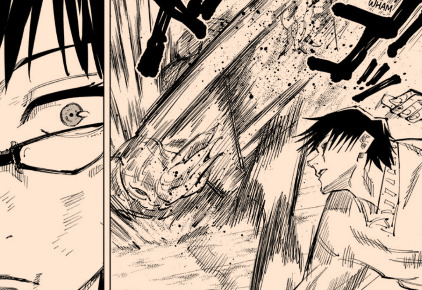
So, in effect this arc has presented Maki with the two options she has to go forward.
Return to the Zen’in Family as she originally planned. Abandon everything for the sake of strength and her personal pride.
Only to show her that she’s too weak currently to accomplish either. She can’t be Toji, and she can’t be Naobito. However, Maki has an option that neither Naobito nor Toji has. She has her sister. She has Nobara. She has the rest of the students at Jujutsu Academy. If Maki lets these people in, they can open her eyes, and show her that both are a possibility to her. She can be both strong as an individual, and still have a family to lean on, and lean on others.
Her sister is someone she needs to reconcile with not win against. She’s not going to be Naobito or Toji, she’s going to be better than them both.
#1-percentbettereveryday#jjk meta#metasks#maki zenin#fushigoro toji#nobara kugisaki#zenin maki#kugisaki nobara#jujutsu kaisen#jujutsu kaisen meta#jujutsu kaisen theory#jujutsu kaisen analysis#meta
182 notes
·
View notes
Text
Am I My Brother’s Keeper?: Nie Mingjue and Jiang Cheng
Or, how the two most virulent Wen-haters in the story tragically mirror each other in far more ways than just their issues with the Wens.
I’ve written about MDZS’s use of character trios as a narrative structure before (here and here). In this meta I’m going to talk about the main three and the Venerated Triad. I’ve also written before about how Lan Xichen and Jin Guangyao’s relationship (however you interpret it) parallels Lan Wangji and Wei Wuxian’s, with Lan Xichen as a strong Lan Wangji foil (fitting, as they are the “Twin Jades”), and Jin Guangyao as a strong Wei Wuxian foil (as Wei Wuxian himself acknowledges in the story’s final chapter). So let’s talk about the third member of these trios: Nie Mingjue and Jiang Cheng, who also closely foil each other... in particular, through their respective relationships with Jin Guangyao and Wei Wuxian.
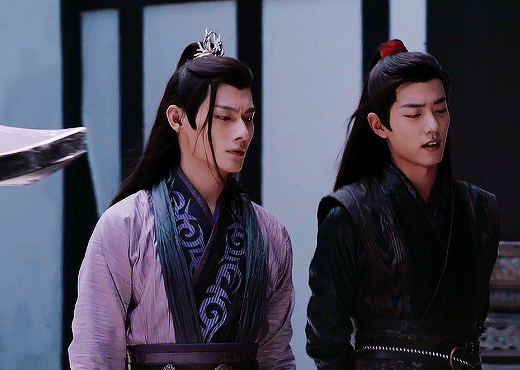
But wait, you say. Jin Guangyao killed Nie Mingjue, which parallels Jiang Cheng killing Wei Wuxian!
True. There are some parallels between Jiang Cheng and Jin Guangyao (such as JC killing WWX to avenge JYL, even though she wouldn’t have wanted that, and JGY doing it when NMJ hurts NHS, even though NHS adored NMJ), as well as between Chengxian and Xiyao, but this is not a meta about those specifically.
Nie Mingjue tried to kill Jin Guangyao in life (twice), and actually does do so in the end, and Jiang Cheng helped kill Wei Wuxian even if he did not do it directly. The reason both Nie Mingjue and Jiang Cheng were able to treat their brothers like this was because of their immense privilege, the privilege neither acknowledge until it is time to weaponize it. In those moments, both chose not to empathize but to see their brothers as an “other” instead of as someone they loved (and I do think both Nie Mingjue and Jiang Cheng loved Jin Guangyao and Wei Wuxian in a realistic, flawed way). In the otherizing of their brothers, both Nie Mingjue and Jiang Cheng put on robes displaying society’s flaws as blatantly as Sect Leader Yao does, but with a lot more humanity than the flat, static Sect Leader Yao. Thus, MXTX tells us we cannot even “other” society as a whole.
If this sounds like I’m hating on either character, I’m really not intending to. They’re great characters and I enjoy both of them (Jiang Cheng’s one of my very favorites), but they’re flawed, and in fact that’s the whole reason I like them. But I do admit this essay will be scathing to an extent; just know it doesn’t touch on my whole opinion of their characters, and isn’t meant to excuse Wei Wuxian (who had a savior complex) and Jin Guangyao (who sought society’s approval to his own doom); I’ve just previously excoriated those two.
I. Defining Justice as Trauma
Nie Mingjue and Jiang Cheng both lost their fathers to Wen Ruohan (as did the Lan brothers), and both vowed to wipe out the Wens as a result. However, both of them fail to think about the Wens as people, and wind up, well, becoming eerily similar to the worst Wens.
Jiang Cheng has lived through the pain of losing everything (status, family, home) and he not only refuses compassion for the two Wens who saved him so that he could fight to get those things back, but inflicts the same traumas on them. In fact, Jiang Cheng’s reaction to Wen Qing’s predicament post-Sunshot campaign is paralleled explicitly with Nie Mingjue’s:
Jiang Cheng’s brows were knitted. He rubbed the vein that throbbed at his temple and soundlessly took in a deep breath, “… I apologize to all of the Sect Leaders. Everyone, I’m afraid you don’t know that the Wen cultivator whom Wei WuXian wanted to save was called Wen Ning. We owe him and his sister Wen Qing gratitude for what happened during the Sunshot Campaign.”
Nie MingJue, “You owe them gratitude? Isn’t the QishanWen Sect the ones who caused the YunmengJiang Sect’s annihilation?”
...
Lan XiChen responded a moment later, “I have heard of Wen Qing’s name a few of times. I do not remember her having participated in any of the Sunshot Campaign’s crimes.”
Nie MingJue, “But she’s never stopped them either.”
Lan XiChen, “Wen Qing was one of Wen RuoHan’s most trusted people. How could she have stopped them?”
Nie MingJue spoke coldly, “If she responded with only silence and not opposition when the Wen Sect was causing mayhem, it’s the same as indifference. She shouldn’t have been so disillusioned as to hope that she could be treated with respect when the Wen Sect was doing evil and be unwilling to suffer the consequences and pay the price when the Wen Sect was wiped out.”
Lan XiChen knew that because of what happened to his father, Nie MingJue abhorred Wen-dogs more than anything, especially with how intolerable he was toward evil. Lan XiChen didn’t say anything else.
There’s a lot of irony in this. Wen Qing didn’t speak up because she wanted to protect her little brother--something Nie Mingjue should have been able to relate to, considering he sent Huaisang to safety in the Cloud Recesses during the war. Also, I mean, Nie Mingjue, you didn’t exactly rise up against Wen Ruohan until you knew you had the forces to win. He likely spent several years in begrudging deference to him, even sending Nie Huaisang along as tribute when Wen Chao demanded it. Jiang Cheng starts to do the right thing in this scene by speaking honestly about Wen Qing, but then Nie Mingjue reminds him of society and propriety, and Jiang Cheng backs down, crushed under society again. Both of them commit sins of omission, in that they stand back and allow society to belittle and vilify people.
The “sins of omission” is a motif that continues in both Nie Mingjue’s and Jiang Cheng’s arcs. For example, Jiang Cheng stood by to let Mianmian be brutally killed in the cave of the Xuanwu of Slaughter, and even stood by to let Lan Wangji and Jin Zixuan die too as they protected her. He goes on to blame Wei Wuxian for the deaths of his family because of Wei Wuxian saving them. Nie Mingjue keeps the truth about the saber spirit from Nie Huaisang, and additionally, the very same conversation about Wen Qing referenced above, Nie Mingjue is directly stated to know Jin Guangyao is lying to help his father, and he says nothing at all even though Wei Wuxian’s life hung in the balance. (It then karmically backfires on Jin Guangyao).
Jin GuangYao came to save the day, exclaiming, “Really? That day, Young Master Wei busted into Koi Tower with such force. He said too many things, one more shocking than the next. Perhaps he said a few things that were along those lines. I can’t remember them either.”
... As soon as he heard it, Nie MingJue knew that he was fibbing on purpose, frowning slightly.
...
One of the sect leaders added, “...Excuse my bluntness, but he’s the son of a servant. How could the son of a servant be so arrogant?”
With him having brought up the ‘son of a servant’, naturally there’d be some who connected it to the ‘son of a prostitute’ standing in the hall. Jin GuangYao clearly noticed the unkind stares.
While Nie Mingjue is quick to accuse Wen Qing for her inaction but languid with his own, this isn’t exactly unique. He also is quick to accuse Jin Guangyao of standing by as Jin Guangshan manipulates to acquit Xue Yang for his crimes against the Chang Clan. (I’m not defending Jin Guangshan or Jin Guangyao in this.) How dare they stand there and not argue for justice?
In spite of Nie MingJue being a junior to Jin GuangShan, he conducted himself in a strict manner and refused to tolerate Xue Yang no matter what. With an angry lecture, Jin GuangShan was left with no words and a great deal of embarrassment. Nie MingJue, as the irritable person he was, unsheathed his saber on the spot with the intention of killing Xue Yang. Even when his sworn younger brother LianFang-Zun, Jin GuangYao, attempted to ease the situation, he ordered him to leave. After a harsh scolding, Jin GuangYao hid behind Lan XiChen, not daring to say anything else. In the end, the LanlingJin Sect could only give in.
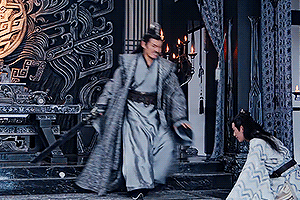
But, Nie Mingjue never offers a critique of Jin Guangshan when Jin Guangshan lied to Nie Mingjue’s face about Meng Yao. He discovered that Jin Guangyao’s stepmother is routinely beating him, and Nie Mingjue does nothing. Even if his hands were tied, if he really cared about doing the right thing, why didn’t he intervene somehow, some way, for his brother? If he really cared about holding people responsible for their actions, about making sure justice was served above everything else, why is it that the only person he consistently holds accountable is Jin Guangyao?
Could it be that, much like society, what Nie Mingjue was angry about was not injustice, but actually his hurting self? His hurt pride, his hurt child self still reeling from the cruel way Wen Ruohan betrayed his father and left him to die an agonizing death?
Likewise, Jiang Cheng knows, when he leads the siege at the Burial Mounds against the Wens, that no Wen there is dangerous. They are all elderly or children, not soldiers. He knows even that his sister died saving Wei Wuxian’s life, but chooses to ignore her wishes to satiate his own anger and the inner child inside of him still crying in loneliness. No one had ever chosen Jiang Cheng: his mother viewed him as a disappointment, and his father preferred Wei Wuxian, but Wei Wuxian promised to stick by Jiang Cheng no matter what. When Wei Wuxian breaks this promise, Jiang Cheng never gets over this, and carries out revenge on him for choosing actual justice over staying close to Jiang Cheng (looking back, this adds a symbolic irony to Jiang Cheng refusing to intervene and save Lan Wangji and Jin Zixuan in the cave: they are both the people who will be his siblings’ spouses).
But the sad reality is, it’s a false dichotomy. Wei Wuxian did not choose the Wens over Jiang Cheng. Jiang Cheng, like society, chose society and conformity over Wei Wuxian.
I’ve said it before, but while Jin Guangyao isn’t correct that the siege on the Burial Mounds is “all” Jiang Cheng’s fault, he’s not wrong when he makes this point:
“But what you have to understand is that, for what happened to Young Master Wei in the end, you are responsible too and in fact, you are very much so. Why did so many people crusade against the YiLing Patriarch? Why did they shout their support, no matter if they were involved or not? Why was he one-sidedly condemned by so many? Was it really their sense of justice? Of course not. A part of the reason is you.”
...
“… Back then, the LanlingJin Sect, the QingheNie Sect, and the GusuLan Sect had already finished fighting over the biggest share. The rest could only get some small shrimps. You, on the other hand, had just rebuilt Lotus Pier and behind you was the YiLing Patriarch, Wei WuXian, the danger of whom was immeasurable. Do you think the other sects would like to see a young sect leader who was so advantaged? Luckily, you didn’t seem to be on good terms with your shixiong, and since everyone thought there was an opportunity, of course they’d add fuels to your fire if they could. No matter what, to weaken the YunmengJiang Sect was to strengthen themselves. Sect Leader Jiang, if only your attitude towards your shixiong was just a bit better, showing everyone that your bond was too strong to be broken for them to have a chance, or if you exhibited just a bit more tolerance after what happened, things wouldn’t have become what they were. Oh, speaking of it, you were also a main force of the siege at Burial Mound…”
II. Privilege
The main villain of all of MXTX’s novels is privilege (I’ve touched on this here and here and here). Unfortunately, both Jiang Cheng and Nie Mingjue are heavily infected with it, and it’s partially why they treat others as they do.
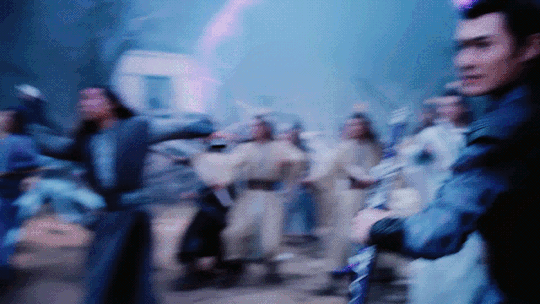
Jiang Cheng speaks negatively of Mianmian in chapter 56, noting that she’s probably just the daughter of a servant. When Wei Wuxian challenges this by pointing out he is also the son of a servant, Jiang Cheng expresses that Wei Wuxian is somehow different (and to be fair, he is indeed treated with more respect because of Jiang Fengmian’s background with Wei Wuxian’s mother), but the implication is also classist. Ironically, again, when Jiang Cheng will not speak up for Wei Wuxian or Wen Qing during that same conversation referenced earlier, Mianmian does; though Nie Mingjue expresses admiration of her for doing so, he does not do the same.
Additionally, Jiang Cheng says the following about Jin Guangyao:
Wei WuXian, “Isn’t Jin GuangYao here now? Jin GuangYao seems so much better than him.”
Jiang Cheng... “So what, if he’s better? No matter how much better he is, no matter how clever, he could only be a servant who greets the guests. That’s all there is to his life. He can’t compare with Jin ZiXuan.”
This pretty much sums up how society treats Jin Guangyao, and Jiang Cheng doesn’t think to question it. Wei Wuxian, on the other hand, points to Jin Guangyao’s character, which at that point looked decent (even if... later... sigh). Additionally, it’s hard not to see this as a commentary on how people think Wei Wuxian should be acting. Even though Jiang Cheng is, er, wrong about how far Jin Guangyao can rise, he contrasts with Jin Guangyao in how Jin Guangyao builds the lookout towers to provide justice for the common people, while Jiang Cheng encourages Jin Ling’s initially snobbish behavior (leaving common people in traps).
Not only that, but Jiang Cheng routinely commits atrocities under his protection as a sect leader. He’s described as having whipped the flesh off the backs of people accused of demonic cultivation, and supposedly no one arrested for that survived his tortures (ironically, Wen Ruohan is also known for torture). As someone pointed out once, the people who would turn to demonic cultivation are likely those unable to form golden cores (Wei Wuxian), or those taken in as disciples too late/too untalented to do so (Mo Xuanyu); Xue Yang was also taken in late as a disciple, but is noted to be unusually talented. The interesting thing is that all three of these people are from impoverished, humble origins. Thus it’s very likely the people Jiang Cheng was arresting and torturing to death were not wealthy cultivators (not to mention other sects would complain if so), but common folk.
As for Nie Mingjue, Jin Guangyao goes further than Wei Wuxian and directly attempts to challenge Nie Mingjue to acknowledge his privilege with brutal honesty on his own part, only for it to go... poorly.
Nie MingJue, “There’s no need for explanations. Come back to me with Xue Yang’s head in your hand.”
Jin GuangYao still wanted to speak, but Nie MingJue had already lost all patience, “Meng Yao, don’t speak such pretentious words in front of me. Your whole thing stopped working on me since a long time ago!”
Within a second, a few degrees of unease flashed over Jin GuangYao’s face, as though someone with an unmentionable illness was suddenly exposed in the public. There was nowhere for him to hide.
He spoke, “My whole thing? Which whole thing? Brother, you’ve always yelled at me for calculating people and being too dishonorable. You say that you’re a proud, righteous person, that you aren’t afraid of anything, that propen men shouldn’t need to play with schemes. That’s fine. Your background is noble and your cultivation is high. But what about me? Am I the same as you? First, my cultivation isn’t as firm as yours. Ever since I was born, has anyone taught me? And second, I have no prominent background. Do you think that I’m in a steady position, here at the LanlingJin Sect? Do you think that I can rise into power the moment Jin ZiXuan dies? Jin GuangShan would rather bring another illegitimate child back than want me to succeed him! You think that I should be afraid of nothing? Well I’m afraid of everything, even other people! He whose stomach is full believes not him who is starving.”
Nie MingJue replied coldly, “In the end, all you mean is that you don’t want to kill Xue Yang, that you don’t want your position at the LanlingJin Sect to waver.”
Jin GuangYao, “Of course I don’t!”
He looked up, unknown fires dancing within his eyes, “But, Brother, I have always wanted to ask you something—the lives under your hands are in any regard more than those under mine, so why is it that I only killed a few cultivators out of desperation and you keep on bringing it up, even until now?”
Nie MingJue was so enraged that he began to laugh, “Good! I’ll give you my answer. Countless souls who have fallen under my saber, but I’ve never killed out of my own desires, much less to climb up the ladder!”
Jin GuangYao, “Brother, I understand what you mean. Are you saying that all of the people you killed deserved their deaths?”
With courage gathered from nowhere, he laughed and walked a few steps closer to Nie MingJue. His voice raised as well, asking in an almost aggressive manner, “Then, may I ask, just how do you decide if someone deserves death? Are your standards absolutely correct? If I kill one but save hundreds, would the good outweigh the bad, or would I still deserve death? To do great things, sacrifices must happen.”
Nie MingJue, “Then why don’t you sacrifice yourself? Are you any nobler than them? Are you any different from them?”
Jin GuangYao stared at him. A moment later, as though he had finally either decided on something or given up on something, he replied calmly, “Yes.”
He looked up. In his expression were some of pride, some of calmness, and some of a faint insanity, “I and they, of course we are different!”
Nie MingJue was infuriated by his words and his expression.
He raised his foot. Yet, Jin GuangYao neither avoided nor took defense. The kick landed right on him, and again he rolled like a pebble down Carp Tower.
Nie Mingjue, here, is being compared to two other people: the man who kicked Meng Yao down the stairs at a brothel as the man dragged Meng Shi outside naked to humiliate her, and with Jin Guangshan--the very person Nie Mingjue’s enraged with--by doing the same thing: kicking someone he views as lower than himself down the stairs. Instead of addressing the actual problem (Jin Guangshan), he finds a scapegoat. It’s not a good look. All three of these instances are linked with society standing by and allowing it to happen, with a few exceptions: Sisi intervenes with Meng Shi, and Lan Xichen intervenes to stop Nie Mingjue from killing Jin Guangyao.
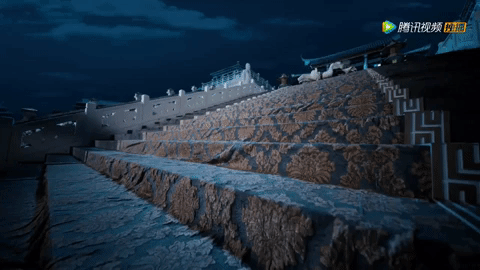
Nie Mingjue never had to kill to climb the ladder within his sect. He did have to kill to climb the ladder in the cultivational world--and he actually did so, through killing the Wens. Yes, I know Nie Mingjue killed the Wens because he wanted revenge for his father and protection for himself and his brother, but the problem is... that’s exactly what motivated Jin Guangyao: protection. Jin Guangyao just had more to fear than Nie Mingjue.
The irony of the above scene that Jin Guangyao knows killing is wrong, but it’s how to survive in this world, so he does it anyways. Nie Mingjue thinks the problem of someone thinking they are entitled to kill can be solved by killing the one who says such a thing, because he’s entitled to kill someone who thinks they’re entitled to kill-- You get the point.
That sad thing is that being shoved down the stairs doesn’t even end that scene. Nie Mingjue directly attempts to murder Jin Guangyao:
Just as Nie MingJue unsheathed his saber, Lan XiChen happened to leave the palace to see what was going on, concerned after having waited for long. Seeing the situation before him, he unsheathed Shuoyue as well, “What happened, this time?”
...
Nie MingJue, “... I know what I’m doing. He’s beyond hope. If these keeps on going, he’ll do the world harm for sure. The earlier he’s killed, the earlier we can relax!”
This does not at all justifying Jin Guangyao’s subsequent murder of him, but again, Jin Guangyao kills to protect himself, and he’s not without cause for fear of his life (this does not justify, because neither is Nie Mingjue entirely without cause, but people have gotta acknowledge that reality).
III. Reasons to Kill
I often see Nie Mingjue held up as someone who judged people based on their actions and was countercultural in that he was willing to stand up to Jin Guangshan when Jin Guangshan wanted to acquit Xue Yang of slaughtering the Chang Clan. However, this is decidedly not the case. Nie Mingjue is very much acting within society’s principals here (calling someone else out is hardly unique or noble: see, Su She, Jin Zixun, etc.) Nie Mingjue stood up to Jin Guangshan then because the crime was so severe he knew he might actually be able to win; otherwise, he let Jin Guangshan do as he wished.
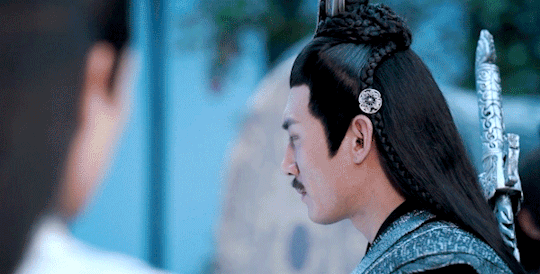
To illustrate this, I’ll share the piping hot tea a commentator spilled on one of my fics recently, because she says it perfectly:
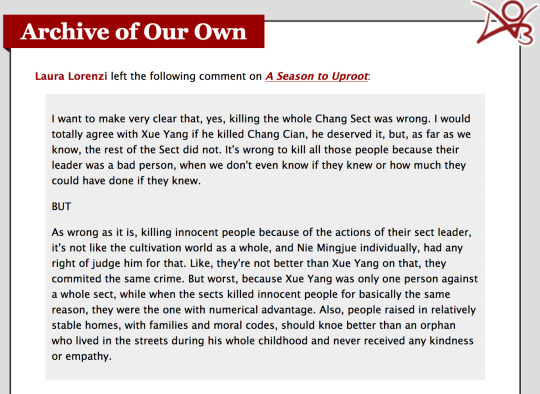
She isn’t wrong. You can hold Xue Yang--and Jin Guangyao and Wei Wuxian, for that matter--responsible for their actions and also point out the hypocrisy of a society that holds to ideals of how people behave, yet is constantly making exceptions for themselves. Nie Mingjue does just this by demanding Xue Yang’s head as a price for not killing his own sworn brother. Jiang Cheng does just this by murdering the older, helpless Wens at the Burial Mounds, and turning his back on the Wens who saved Jiang Cheng’s own life.
Why do these characters kill?
Nie Mingjue and Jiang Cheng killed out of revenge to honor their families and save themselves.
Jin Guangyao killed to get his father to acknowledge him as his son, and then in revenge when he realized he never would, and to save himself.
Wei Wuxian killed out of revenge and then out of despair--really, revenge against the whole cultivational world that had set him up for failure no matter what he did.
Xue Yang killed out of revenge for his little finger.
What do all of these have in common? They reveal what each person prized.
Jiang Cheng and Nie Mingjue prized the honor of their culture and of society.
Wei Wuxian prized his loved ones.
Jin Guangyao prized himself as his father’s son, a sort of combination of JC/NMJ’s status love and WWX’s wanting to be loved.
Xue Yang prized his body.
Xue Yang seems condemnable on paper, but let’s look at this a little deeper: what else did Xue Yang have? Nie Mingjue inherited a sect and had his beloved little brother, men who would die for him, people who admired him. Wei Wuxian had his loved ones, and then they were gone. Jin Guangyao had his dead mother’s wish for him to be approved for by society, and a famous father. What exactly did Xue Yang have besides his own body? He didn’t have parents, as far as we know. What else was he to value? Why is Nie Mingjue venerated, and Xue Yang condemned? Why is Jiang Cheng allowed to torture the poor under him for so many years, just because they reminded him of his brother, and Xue Yang hunted down?
The only answer is privilege. It’s privilege that allows Nie Mingjue and Jiang Cheng to decide when and how they want to enforce justice, and if they do at all. It’s privilege that they had families to avenge. It’s privilege that enables them to commit atrocities and get second, third, fourth chances. It’s privilege of his birthright than enables Jiang Cheng to never once die in the novel (Nie Mingjue not so much). But when Nie Mingjue dies, he seeks revenge on his murderer, not justice. He kills countless others in his quest to kill Jin Guangyao, people who had nothing to do with his death, and he could have killed his own brother. Even when he succeeds he ends up battling Jin Guangyao in a coffin sealed for a hundred years--hardly a victory.
So since we’ve brought him up, let’s talk Xue Yang and the Yi City trio now. The “judgy” member of the Yi City Trio is decidedly not privileged (A-Qing, as @thisworldgodonlyknows wrote about her, foils Nie Huaisang, but also she foils Nie Mingjue), and her character reveals these precise flaws in Nie Mingjue and Jiang Cheng. She is a beggar girl and a thief, but she seeks justice for Xiao Xingchen and Song Lan out of nothing more than love. She herself does not kill, and frankly I’d say she is the moral backbone of the series more than any other character (along with perhaps Mianmian). She was never a part of society, after all.

A-Qing dies young, alone by a river, mutilated. She has no privilege, but her spirit survives as a ghost solely because of her desire to ensure justice for Xiao Xingchen and for Song Lan. Her condemnation of Xue Yang is at first admittedly selfish--she was jealous--but then honestly understandable and easier to swallow, since she came from a similar background. But because of this, and because A-Qing is willing to empathize, she ends up understood and her wishes fulfilled. In the end, Song Lan leaves with the remains of her soul, determined to heal both her and Xiao Xingchen.
As I wrote here, A-Qing is also faced with a dark version of herself in Xue Yang. Similarly, Jiang Cheng is faced with a dark version of himself in both Su She (jealous of Lan Wangji, jealous of Wei Wuxian; he calls out their arrogance) and in Jin Guangyao in the temple, and only then is he able to move forward and grow. Nie Mingjue, unfortunately, did not recognize the dark version of himself in Jin Guangyao, and ends up trapped with him.
#mdzs#mdzs meta#mo dao su zhi#the untamed#cql meta#cql#chen qing ling#nie mingjue#jiang cheng#jiang wanyin#chifeng-zun#jin guangyao#wei wuxian#a-qing#xue yang#xue chengmei#wei ying#meng yao#mianmian#luo qingyang#song lan#xiao xingchen#jin guangshan
186 notes
·
View notes
Note
Would you mind sharing your thoughts about vex and Beau being cross campaign foils?
so!!!! first things first: apologies for taking weeks to answer this, finals + having adhd sometimes makes my brain turn to mush and forget every ask ive ever recieved. second of all, i’m assuming you sent me this bc of what i said in my vm vs. m9 how they view the world meta. and i’ll be real with you. i have exactly 0 memory of what was going through my head when i wrote that line, so i am simply going to type out a bunch of thoughts that i have on the similarities and differences between beau and vex and i hope that lives up to what you were expecting jsdflksjdksld
I'll detail some specifics in a moment, but overall, I think beau and vex share a very similar kind of trauma of exclusion in their formative years, that's caused them to have a lot of similar traits that manifest in different ways - for vex, she maintains control through her material posessions and beau finds an emotional control in her asshole-ness. I've broken this down into 5 points on which I think comparing the two really emphasizes that claim:
1. daddy issues: both beau and vex have awful no good terrible very bad dads. both syldor and thoreau can suck my ass. they both raised their kids with little love and impossible-to-meet expectations, alientating them and leaving them with lifelong feelings of inferiority and unbelonging. If beau and vex were to meet, i think they would have a very friendly toast to shitty dads, and then have a good drunk vent about it an hour later.
but, at the same time, the actual minutae of their trauma and the ways it manifests are nearly polar opposites. syldor wanted nothing to do with vex, or else wanted her to somehow become a full elf. her issue was that she would never be able to belong, despite her desire to, and as she grew up it lead to her being overly protective and even possessive of the people she found who DID accept her as she was.
With beau, rather than exclusion, her father created an environment of toxic inclusion. He created a role for beau to belong in, disregarding her distate for actually fulfilling it. And, as such, she ended up making herself into someone who could have no expectations and pushed away anyone who tried to set them up for her. In the end, they both came to love themselves by abandoning the woman their father wanted them to be but for vex it was the laying down of an impossible dream and for beau it was the picking up of a mantle she had feared to wear.
2. brothers: now, on the topic of family, I also think its really interesting how their interactions with their brothers play out. We've got vex and vax, tied at the hip til the very end and then some; and then we've got beau and TJ - decades apart and with beau barely acknolwedging TJ's existence. But, even that distance between beau and TJ didn't stop her caring for him when they actually met. She gave him lucky Jade, and she entertained the idea of kidnapping him to get him away from her stinko dad.
And I'd espeically like to talk about what she said outside the hag's hut - "I think Luc and TJ could be best friends", in comparison to the way Vex reacted when Vax told her was going to Zephrah with Keyleth for the year break. There's an aspect to the way they interact with their brothers that lets them slip back into those bad habits they formed growing up (NOT that i'm claiming vex and vax were like toxic for each other. but even good relationships can have unhealthy moments).
With Beau, when she offers to give her happiness so TJ can grow up safe, she's trying to take on the role she's ""supposed"" to fill - the big sister, the protector - because she failed to fill the one her father set out. And with Vex, when she grows jealous of Vax, it's because she's afraid that his leaving with keyleth is a sign that she no longer belongs in his inner circle, and she falls back on that childish, desperate desire to do anything to be accepted unconditionally.
3. romance: spoilers for 5 or so most recent m9 eps (115-120) if you haven't watched them ahead!!!! at this point, both vex and beau have an endgame romance - percy and yasha respectively. Obviously as the m9's campaign is still playing out, that could change, but like. yasha wrote her a love letter and they're officially going on a date so i'm counting that as at least endgame-track rather than just random flirting. What's interesting to me is that they both seem to flip between the SAME roles between their (in-game) general perception and their actual pursual of romance.
Vex gets characterized as a pretty big flirt, right? She's got the winks, the casual "darling". She's flashed grog her boobs on multiple instances with little prompting. Beau, similarly, has easily the most game out of anyone in the m9. She's slept with two guest characters and at least one more npc in the events of the game. Caleb made her a fuck mirror in her room in the mansion. And yet, in both of their actual romantic endeavors, they became the shy, uncertain type.
Vex only confessed her feelings when Percy was laying dead before her, and not an hour of game play before percy kissed her in the woods, she had a talk with vax about how she was pretty sure he didn't like her that way and she didn't want to pursue it. Beau, similarly, spent a very long time convinced that yasha wasn't looking for love after zuala, especially not in anyone like her, asked everyone in the party if they thought yasha ACTUALLY liked her, just to be safe, and then still terrified to ask her out after recieving a literal love letter. I'd argue this shift comes from that same sense of unbelonging - they're very good at pretending they fit a role but doubt their actual right to take it when the opportunity is presented. This time, the role is the lover rather than the daughter.
4. authority: Both vex and beau grew up shunned by the upper crust of society, and grew to mistrust those kinds of people. And yet, both of their arcs result in them assuming such a position. Vex, thrown out of high society gets her place as a baronness, and Beau, running from leadership of her father's business ends up a top member of the Cobalt Soul. There's not a lot here, but I find it interesting how both of their stories involve them shedding their baggage regarding authority and power and assuming it in a way that they feel comfortable in - invitation by someone she trusts for vex, and a promise of freedom of will and control for beau.
5. their deadliest sins: this is the point at which their similarities culminate and transform to a fundamental difference. despite everything they share - shitty childhoods, the small piece of family that's still good, flirtiness masking shy love, and a mistrust of those in power - vex and beau are such different characters because of their biggest vices. Vex, both in game and out, is "the greedy one". She's stingy with money, she haggles for everything, she mourns the loss of physical objects. Beau is "the mean one". She cares little for people's feelings if they're not in her immediate circle, she focuses on her tough guy image, she laughs at things she knows she shouldn't.
And, over the course of the campaign, as they find unconditional acceptance, they grow away from these traits (I won't say they grow out of them) because they heal from the things causing these vices to begin with. I've always been vocal about vex's greed being a manifestation of her class insecurity, and beau's asshole-ness stemming from her fear of being forced back into another position of complacency. And I stand by that now - all the similarities in their backstories are what tally up to these different women.
Despite her careful tally of party funds and her reflexive bargaining, vex is not cruel. she is not angry on her own behalf. She saves two boys from the market in the city of brass at great personal cost, she relinquishes an entire dragon's hoard to the devastated city of Westruun, she took the time to save a baby bear from a cage when she could have just cut and run after escaping her own. She's the first one most people go to when they need a shoulder to cry on, and she's devastated when they don't (thinkin about when Scanlan left). She carved "forgiveness" into the bow she stole from a man after killing him by proclaiming how much she loved someone, because she knew anger had no place in her heart.
And Beau, Beau is a bitch and she's harsh, but she doesn't hoard or protect like vex did. she spends her money without much of a second thought. She pitches in to help her friends buy a ton of glowsticks, and she loves to indulge in material desires like drink and good food and the nicer inn room. She's a member of an organization that's about making knowledge public rather than guarding it. And, though this may be controversial, I think her position with bowlgate of "its not our problem what cali wants to do with it", her long-standing mistrust of their alliance with the bright queen and and more recently with the tomb takers of "i want to go in and talk, rather than assuming they're antagonistic, even if it puts us at a disadvantage" are both examples of this non-possessiveness too - she has no need or desire to get involved in controlling what other people are doing.
so, i guess the general conclusion here is: vex struggles to let go of things, of money, of people. beau struggles to let herself be known in case she gets wrongly interpreted again. they both fight feelings of inadequacy, they both fight the feelings of not belonging, of 'doing it wrong', they fight the perception of them as shitty people because of the shells they hide in despite their absolute hearts of gold. but at the end of the day, vex's story is one of having to lay down what could never be hers so she can carry what is, and beau's story is one of allowing herself to be known so a place can be made for her.
#hope this is what you and that other anon were looking for jdsflkdsajfsaldfsa#critical role#vexahlia#beauregard#long post
44 notes
·
View notes
Text
G25 Part 2 Essay, Very Dense
There is very little I will say as a preamble besides that Part 2 was a very powerful conclusion to an extremely climatic arc. That being said, spoilers below and my Part 1 essay can be found here.
I will start by saying that although I am quite satisfied with this ending I wish things could have ended differently. This is the first time we were given antagonists who were actual individuals we had to overcome. And in doing so, we were faced with people who had powerful reasons and motivations to sacrifice for. That is something I will come back to later so—
In a broad overview of the plot of Part 2, we were given an uplifting reunion with Talvish, who claims that his decisions and choices were made with the Milletian’s best interests in mind. And it’s nice* to work together after so long, to finally have him fulfill the promise of being with the Milletian at the very end. There is a sweet moment where the roles are reversed and the Milletian asks him if he is alright. Instead of being asked to trust him, he wholeheartedly puts his trust in the Milletian.
*if you know me even just a little, you know I simp hard for this man and let me tell you I went from “I will be the first one to punch him” to “please don’t go” in a matter of minutes
And then, when everything is rewound and the Milletian is able to protect their friends and prevent the worst possible ending, all the Good Guys have a Good Time. This is of course, glossing over the fact that Deirbhile sacrificed herself, Tani dying with a finality that Milletians shouldn’t have, Piran falling apart, Treasure Hunter breaking down, and Marleid conflicted over what to do with her extremely Problematic Childhood Friend.
We still got to have a good time! We got to revel with our friends! Speak with everyone and catch up and talk and chat and eat and—
It was nice but I am very bitter because those good times only emphasized how different it ended for Cethlenn and Vayne.
If Part 1 was about trauma, Part 2 was about breaking out of predestiny and walking a different path that was set before you. This comes quite literally when Talvish appears and rewinds time* to save the Milletian from the future he saw. He (and later, Hymerark) reveals to us something that touches the fourth wall:
*not sure why I was so surprised that he could manipulate time in such a way when the Milletian’s first meeting with him was through time. Maybe I just thought it was through the Milletian’s powers that they managed to communicate but clearly Talvish’s powers were doing something. Oh dang it makes sense why he isolated himself in a desert for centuries now…because he can’t affect time that he has been personally involved in
The ability to redo main storyline missions when we fail them is quite literally the Milletian, breaking the flow of time to try again until we succeed. Due to the nature of altering timelines, those uninvolved with the messing of time don’t remember all the previous attempts. Later, it is revealed that all our redoes and failures have a negative impact on Erinn; it increases the entropy in the world as different realities are created and then stopped. Tani is a result of that.
It is further revealed that Vayne—or I should say now, Beimnech, is a singularity who experiences all these timelines and realities. He must return to Mag Tuireadh whenever the flow of time breaks because it is the role he has been forced into by Hymerark. He is the counterpoint for Talvish. The two are diametrically opposed, canonical foils with mirroring ideals and views of the world. Beimnech mentions during Eternal Dreams that he has seen Milletians fail to convince Talvish* to change his mind about the world, or fail to garner enough faith in their friends. In the current timeline, Talvish is enlightened by the Milletian and so takes control of his fate and chooses to rewind time instead of having it cut off and restart.
*It is implied that Talvish also experiences the different timelines over and over again, but he forgets it the moment the timeline is replaced with a new one. Alternatively, Beimnech is also taken out of time and space whenever the flow is broken, so the cycles are even more unbearable because he is forced to witness them as an outsider.
Beimnech did not have the liberty of meeting the Milletian before he met Hymerark. Unlike Talvish, he could not surround himself with equal companions and could not hope for a life where he was not just fulfilling a role to balance the world. The only way he could have some control over his own fate as cycles repeated over and over again was to orchestrate his own death*. He remarked before in G24 that had he and the Milletian walked different paths, they could have been friends and not enemies. Both he and Talvish see the Milletian as a savior—as a guiding, bright light. But while Talvish burned alongside the Milletian, Beimnech burned out like dying embers** or a shadow too weak to hold up against illumination.
*maybe it’s selfish, but who can blame him when he only has himself? I seethe with the unfairness of characters that have no choice but to be the “darkness” to contrast the “light”. The “what could have been if things were different” hurts as do the inability to break free from what was laid out. I seethe, but that means the story is doing as intended and I am by no means criticizing, just empathizing (I’d highkey write something like this ngl I am a ball of angst).
**the refrain that plays when the Milletian is prompted to deal the final blow to Beimnech is called The Last of the Heat Fades/Residual Heat Fades Away.
Beimnech’s disappointment in the Milletian in Part 1 is suddenly very understandable. He had pinned all his hopes in one person and he knew they were going to fail. We even saw him return to end the Corrupted Milletian in the future that we never got to witness. He did for the Milletian what he hoped they would do to him*. And then for once, to have time rewind instead of abruptly ending? I can’t imagine…
*I chose to not stab him. Apparently that gives you more of his backstory. Regardless of the decision, when he tells you he lies for the first and last time about his death…
Something can be said about Cethlenn, too, who was “emptied out” by Fodla. His current name, Cethlenn, was given to him by Beimnech, which honestly if you know your myth and lore spawns so much food for thought*. Speaking to Cethlenn in Tech Duinn on Saturdays reveals that Beimnech gave him that name because he always wanted a right-hand man with that name. Whatever that implies to the nature of their relationship… If you have the time, please, please speak to him with all the keywords at your disposal. It’s worth it.
*another food for thought includes Sera being the one to help Piran escape and Beimnech noticing that. Beimnech being Super Old and Super Tired with so much bottled up Memories and Experience like the opposite of Talvish With a Purpose okay one day I will actually write a whole essay about their foils—
Ultimately, Cethlenn is given the choice to be the watcher in the mists of Feth Fiada. He acknowledges his crimes* and so he refuses to exit (except on Samhain aka Saturday). He is openly antagonistic towards everyone except Marleid, which is understandable. He thinks he has tied Marleid down. Further conversations with him in Tech Duinn reveal that he’s pugnacious and as eager as Vayne once was to spar with the Milletian. He’s also very easy to bully. He implies that in the future, he may recover the powers he lost in his deal with Hymerark and will use those powers for the greater good so…more Cethlenn content in the future? Hopefully?
*what worried me the most at the end of G24 was that I could not see how he or Vayne could be redeemed. I would scoop them up in a heartbeat. But could my Milletian? Could the people of Erinn? Obviously not.
I know I brought up the concept of escaping predestiny and then dropped it like a hot potato so I’ll do some quick rundowns now of other examples. Enya realizing that she can have a life beyond just staying in her sanctum and caring for the Holy Flame, Piran gathering the courage to recognize his own existence is worth something, Hymerark* realizing that there is no reason to continue to mess around with people and she can just observe. I’ve rewatched the conversation the Milletian has with Hymerark after the battle and I don’t even know where to start…Talvish remarked that she’s the closest in resemblance to Aton Cimeni’s will since she balances both freedom and chaos. Maybe these higher gods were never meant to have sentience or conscience because the moment they do, they make decisions and bam the whole world is a mess.
*the Milletian seem to do this to all the gods, huh?
My current understanding of things is that the Evil God Balor was created by Aton Cimeni as a counterpoint for Talvish, who is the Guardian, the sentinel of Erinn. Why? For Balance of course. But you can’t just create someone to be evil. Somewhere in between, Aton Cimeni stops answering and while Talvish plots machinations for the future he saw, Balor’s disdain for his role grows and eventually beefs it in a fight with Lugh at the battle of Mag Tuireadh. His body is dead, but his spirit remains, picked up by Hymerark to be the…plug stopping Noitar Arat. I imagine Hymerark also faced the same struggle that Talvish did of attempting to carry out duties imparted on them by their creator but yet new to independence and the weight of their responsibilities that now fell on their shoulders. Hymerark expresses her faint indecision of hearing the wishes of everyone. There will always be conflict in decisions.
Meanwhile, Talvish realizes that the balance has shifted in the absence of the Evil God Balor and so the events of G21 happen, where he attempts to recreate the balance with his own hands and summon something to replace Balor. While this fails, Hymerark tries to do the same again by corrupting the Milletian and making them the final obstacle to correct the unending cycle that, frankly, started because of her.
In G25 Part 1, Vayne mentions that Aton Cimeni will always have a solution. I suppose in this case, he was talking about how even if he were to disappear completely, someone will always take his place. Just like how Triona’s role was passed on to Millia, a new darkness grows. Not without repercussion, of course. Something is coming and that’s for G26.
In the final confrontation with Beimnech, he offers the Milletian a choice to either kill him now and escape, or perish together with him in the rift. He mentions that in the end, we are all forgotten anyway. I don’t think that is the case. The Milletian lives and the memories of everyone they’ve fought with lives with them. That is their burden. Not everyone can walk a righteous path. Sometimes, desperate individuals seek the wrong help and I like to think that the Milletian recognizes that it isn’t just black and white, and that they are fortunate to have found the right people. Things are just going to get rougher for the Milletian because they’re also a guardian of Erinn, which begs the question: who is the counterpoint for the Milletian? Does one even exist? Does there need to be one?
Instead of ending on such a gloom and doom note, I’ll go full circle and talk about Llywelyn again and his mentions of a sibling again? And also tea time?? 10/10 would fake date Llywelyn just for the court gossip. (LF > political intrigue comic ft. Milletian and Llywelyn dating like it’s 17th century France) Also Llywelyn being the next captain of the Elved Squad?? Tried to imagine him in Talvish’s armor and as I type this I realize they won’t do something stupid like that they’ll just change the emblem on his armor. Alright I think that’s it I’m hitting 2.3k words so—
Oh right something something the Aces go off somewhere again just as Hunter was going to say something…can we get a base for them please? So we can just visit them? So they don’t just pop in and out of the Milletian’s life? Thanks.
I’m about to get super sappy so readers, feel free to skip all of this. I’ve been playing mabi for about 11 years at this point and it has been a long ride. I didn’t start writing these rants and essays until G21 and I also started drawing in earnest about mabi around the same time with comics and fanart. I don’t participate much in the community as a whole because I am an anxiously overthinking person. It’s no surprise that I found comfort characters in mabi and so I return here again and again (not that I’ve ever really left). We’re getting a new game director after G25 and I am extremely grateful for all he has done for the game. And in the same vein, I’m thankful to all of you reading this. There’s no point in creating content when there is no audience, especially when I am as reclusive as I am. So, to my new readers: thanks for coming along. And to my old fans: thanks for sticking around. Until the next chapter!
13 notes
·
View notes
Text
The 100 and the Crab Bucket of Zero-Sum Heroism

This is a feeling I started to get during season 5, and season 6 has definitely confirmed it - since the start of season 5, there has been a definite bias in the writing and narrative framing of the show, designed to make Clarke and Bellamy - and only Clarke and Bellamy - the heroes of this piece, whether it is earned or unearned.
Now, one might say the story has always been about them. And to a point, that’s true. But what happens when your “heroes” have become so morally grey that they’re really just a light shade of dark?
Usually the answer to that would be “make them better”. Yet for some reason, The 100 has taken the complete opposite approach since the beginning of season 5 - there’s been a concerted effort to redeem them not by improving their own actions, but by vilifying others for crimes no different than their own (or even lesser crimes, or no crimes at all). Instead of building their “heroes” up, all they can do is tear others down.
Which brings us to the sociological concepts in the title that are applicable to this analysis:
Crab bucket syndrome is the concept of “if I can’t have it, neither can you” - put into the crab example, it describes how if one crab could escape from a bucket, the other crabs will prevent it from doing so, and thus they all die. In our case, that’s how if Clarke or Bellamy can’t be seen as “good”, then neither should anyone else, and everyone else should be tarred with an even darker brush in order to make them look better.
Zero-sum heroism - a zero-sum game is one in which there’s a fixed amount of reward, so if one person gets a lot, others get very little or none. Zero-sum heroism then would be the idea that there’s a fixed amount of heroism to go around, so for some to have it, others have to lose it.
Now, this is all in how the story is told, not in how the characters themselves act - this post isn’t a commentary on how the characters themselves behave (which is why I’m not tagging it as anti-anyone), but on how we, the viewers, are expected to view and then agree/disagree with their actions and words by the way the narrative frames them.
I started to notice this in season 5, because the target for tear down and villainization was Octavia. In season 6, it is still Octavia, but Raven and Murphy have also been added to the mix, in different ways, but with the same goal - exalting Clarke and Bellamy at the expense of others.
Raven

With only two episodes to go, our favourite zero-G mechanic has had very little to do this season. She’s had two jobs - glorified chauffeur and Miss Morality. You’d think a character talking about morality and doing better should be good, right?
But that’s not how the narrative has cast her. By making this her main role of the season, the narrative frames her as a catty bitch for wanting people to be good. She’s unreasonable for not wanting Clarke to go on the first exploratory mission. She’s mean for calling Clarke out on her repeating course of bad choices. She has to be convinced to not revolt against the Primes and that they need the Primes’ knowledge to build their own compound, but this is Raven fucking Reyes and when has not knowing the answer to a problem ahead of time ever stopped her before?
All the narrative has done to her has been to portray her as bad for wanting to be good, because her good conflicts with the narrative’s ability to exalt Clarke. At first I thought this was in preparation for a moral ladder knockdown - that is, that this season Raven’s going to be faced with one of those impossible choices, so that she’s knocked off her pedestal, as has been done to Clarke, Bellamy and Octavia in the past, but more and more I’m now thinking that it is in fact just to prop up Clarke. Which brings us to...
Murphy
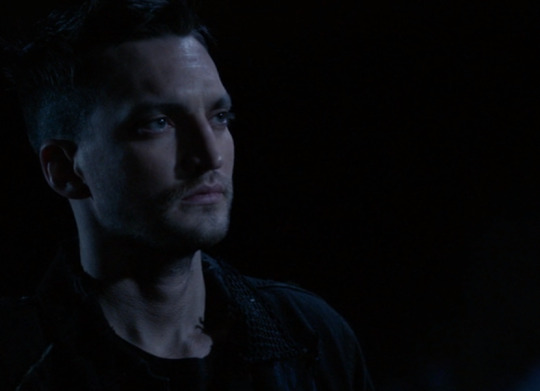
Where this setup has Raven as Clarke’s foil, Murphy is likewise Bellamy’s foil - and this last episode really threw this into stark perspective. What Murphy is doing this season is exactly what Bellamy was doing last season - negotiating with the enemy in an attempt to peacefully save their people. Yet somehow the narrative wants us to believe that Murphy is wrong for doing what he’s done, but we were supposed to cheer for Bellamy when he was doing the same.
Yes, Murphy has some aspect of personal gain going for him, in the name of immortality for him and Emori, but I don’t believe that was his motivation. That was a pacifier. He was pretty sure that if he turned Josephine down that he was at risk of death, and he was right - he learned fast that Josephine was not afraid to kill people in pursuit of her goals. The only purpose the mind drives serve is camouflage - a way to put a “selfish” stamp on him, when everything he’s done has been to try and cut their losses in favour of peace, drives or no drives. Plus this last episode, he was working with them to find Josephine not because he gets that immortality, but because if he failed, the consequence would be Emori’s death.
Not to mention that all of this comes on Murphy just after he’s endured a traumatic near-death experience, which also plays into his choices, which brings us to...
Octavia
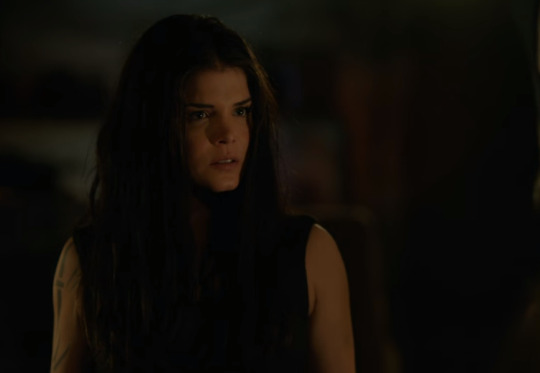
Octavia being cast as the villain (which was all tell and no show, as I talked about here), her PTSD and other mental illness being demonized (see here), and the horrible and hypocritical ways she’s been treated by the other characters is something I’ve talked about at length (here, here, here, here and here). And when I first planned this post, before S6, it was set to be only about Octavia, but I never got to it, and now as S6 is almost over, I saw that other characters fit in here as well. So as this post pertains to Octavia, you can also read the posts that were building up to this one in my series of how everyone failed her (here, here and here).
So with all of that meta already done, let’s get to the meat of how it applies here - by the end of season 4, Octavia’s star was fast on the rise. She saved the human race in a way no one else could. But the narrative sees a flaw to this - Octavia is the tritagonist, not the protagonist, after all, she can’t be more of a hero than the protagonist or the deuteragonist, since she’s a foil to both Clarke and Bellamy (see this post on the head, the heart and the soul) .
So what does narrative do? Make her fall from grace.
But for what? Making impossible choices to save her people? Clarke and Bellamy have done that. Being in charge of who lives and who dies? Clarke’s done that too. Even if you believe that the war against the prisoners was ill-advised (I personally don’t, see here) and something that could have been avoided - Bellamy has also done that.
(Not to mention how the war played out anyway - narrative tells us throughout the buildup to the war that it is something that Wonkru will lose, despite superior numbers and a sneak advantage, ergo why everyone was sabotaging Octavia’s plans. But they won the war in fifteen minutes once all of our protagonists were fighting on the same side, despite having lost half the army and the enemy knowing precisely where they were and when they were attacking. Clearly it was not unwinnable, it was only unwinnable as per narrative because it was Octavia’s plan, as seen here.)
There is nothing that Octavia has done that Clarke or Bellamy haven’t also done. Octavia’s only “crime” is being Octavia, and thus not someone who is allowed to have the hero narrative.
In case there’s any doubt about that, there’s how she’s been treated this season. At the end of season 5, she did what is expected of any repentant “villain” - try to sacrifice themselves, fail, then swallow their pride, step back and be a footsoldier for the good fight. Which is all that’s ever been asked of Bellamy whenever he’s done a Heel-Face Turn (in season 1, and again in season 3).
But that’s not good enough for this narrative. Octavia needs to be kept down. First by being excluded and beaten and abandoned. Then after beginning to find her peace (with no help or apologies from anyone who caused her to lose it in the first place), and in fact finding a peace she’s never had, she keeps having her past thrown into her face by her brother - and a past he wasn’t there to witness, at that, and likely doesn’t have all the facts on. But the narrative still allows him to judge her for something he doesn’t understand and didn’t witness. The narrative is also making her work for forgiveness and redemption, when it hasn’t demanded the same from Clarke or Bellamy (even when other characters have suggested that it should).
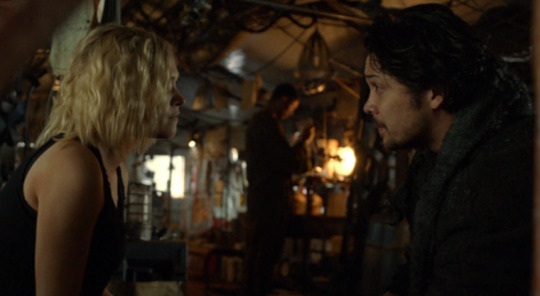
Clarke has been through the wringer this season (well, the episodes where she was present and conscious in her body) in terms of how she’s been treated by other characters, but narrative framing says that we should be sympathizing with her - and I’m sure that by the end of the season, all will be forgiven because of what she’s experienced this season. But she still hasn’t done anything to earn that forgiveness.
We are also supposed to believe - because he’s said so - that Bellamy has learned from his mistakes. But this season has shown that he hasn’t. Other people have had to talk him down from genocide twice. That doesn’t show the growth that the narrative tells us is supposed to be there.
With Clarke out of the picture as far as action goes for most of the season, and Bellamy wanting to go back to his emotional “kill everyone” solutions, it is no wonder that in order to preserve their sanctity as the protagonists of the show, that the narrative has had to throw even more people under the bus to accomplish that. I just question why. Why not treat all of the characters fairly? Why do some need to be disparaged for others to rise? Why not let everyone do better, and be allowed to do so without judgment? Those are some questions I’d like answered.
#the 100 meta#octavia blake#raven reyes#john murphy#bellamy blake#clarke griffin#double standards#narrative framing#zero sum heroism#not here for the writing hypocrisy
107 notes
·
View notes
Text
Community: Britta Perry Is the Worst, Which Makes Her the Best
https://ift.tt/3kixlnw
Sitcom characters very rarely come off of the page fully formed. Many classic (and not-so-classic) network sitcoms rely on time as an ally. Time spent with characters allows for not only an audience to get a better sense of them but also for the writers and actors to do so as well.
Community was no exception. Each of the ensemble cast’s seven main characters (and tertiary characters like Ben Chang and Dean Craig Pelton) arrived in the pilot fundamentally unfinished. And each of them evolved over time, in some cases sharpening creator Dan Harmon and the writing staff’s original assumptions or defying them. No character, however, changed more from conception to execution over time than Britta Perry as played by Gillian Jacobs.
Originally, Harmon designed Britta Perry simply as a romantic foil to series lead Jeff Winger. When Community first premiered in 2009, The Office was entering its sixth season and at the height of its popular appeal. In that context, perhaps bringing a sitcom to NBC without a “Jim and Pam” firmly in place felt unwise. The problem was that the “Jim” portion of that romantic duo, Jeff Winger, was richly realized (having been based on Harmon’s own experiences in community college and played by relentless charm factory Joel McHale), and the “Pam” portion, Britta Perry, was simply a Pam stand-in.
In the first half of Community’s first season, several attempts are made to humanize Britta. In one episode, the pressure she feels as an older student in community college leads her to cheat on an exam. In another, she begins to establish her feminist profile and interest in psychology by (perhaps accurately) observing that her male friends desire to fight class bullies comes from a place of pent-up homoerotic energy. For the most part, however, Britta and her storylines exist only to complement Jeff’s. By episode seven, Britta is suddenly a part of a Jeff Winger-Michelle Slater love triangle whether she realizes it or not.
Britta’s failure to properly evolve as a character in Community’s early episodes was significant enough that other characters on the show started to realize how…well, odd she was. In episode six, “Football, Feminism, and You,” Britta has a hard time connecting with her fellow female classmates, Annie (Allison Brie) and Shirley (Yvette Nicole Brown), because she views the time-honored tradition of visiting the bathroom as a group to be a sinister patriarchal conspiracy.
Read more
TV
The Best Episodes of Community
By Joe Matar
Movies
Community Movie: Donald Glover on Newfound Love for Series, Open to Film
By David Crow
Earlier this year, Harmon revealed in an interview with EW that that plotline came directly from another writer on the show’s observation about just how much Britta sucked.
“When I said, ‘What about Britta,’ [writer-producer] Hilary Winston said, ‘I don’t like her,’” Harmon said. “Listening to Hilary talk about Britta, which started with like, ‘I wouldn’t trust her if I was a woman. I understand that she means well and that she’s saying the kinds of things that you’re supposed to say as a woman, but that’s what makes me not trust her. I need a confidante behind the scenes, because the truth is, I do want to talk about shoes sometimes and I feel like she might sell me out if I did that — and I wouldn’t go pee with her.’ Stuff like that starts to dimensionalize Britta right away.”
By this point the show’s characters, writing staff, and audience had realized that there was something unlikeable about Britta. This was due to the show’s thin conceptualization of her as a character to begin with. But as we said above, time is usually on a sitcom’s side. Community had many more episodes of its first season order to tackle the issue. What’s interesting about how Community figured Britta out is not how it “fixed her” but rather how it leaned into her existing flaws.
cnx.cmd.push(function() { cnx({ playerId: "106e33c0-3911-473c-b599-b1426db57530", }).render("0270c398a82f44f49c23c16122516796"); });
That anecdote about Hilary Winston not trusting Britta turned out to be a feature, not a bug for the character. A lot of Britta’s early traits – her political ideals, defiant attitude, and quick wit – were likely designed to make her appealing to both Jeff and the audience. In reality, they had the opposite effect. So the show just began to lean into those qualities as comedic fodder. Britta retained her same liberal political leanings but the show now highlighted how she had neither the courage or energy to follow through on them. She also quickly became known for accidentally ruining everything around her and snuffing out the joy from her friends’ lives.
In the season one episode “Physical Education,” Community finally provided the terminology for what would become the character’s recurring meme through six seasons of the show (and hopefully a movie). Britta is, quite simply: the worst. After discovering that Britta pronounces “bagels” as “baggels,” Ben Chang reflexively responds with “ugh, you’re the worst.” It’s a small moment to be sure, but one whose spirit Community would continue to capture with Britta time and time again.
Britta is the worst because she calls “bagels” “baggels.” She’s the worst because she ruins the reputations of all the guys she dates for Abed (Danny Pudi) and Troy (Donald Glover). She’s the worst because she insists on being nice to Troy’s awful grandma and gets the switch for her troubles. She’s the worst because engages with the least amount of civil disobedience allowed by Greendale policy. She’s the worst because she won’t buy her one-eyed cat a monocle as “that’s pretentious.” She’s the worst because she supports a lesbian student so enthusastically that she accidentally enters into a romantic relationship with her despite neither the student nor Britta being a lesbian.
Britta is just the worst. And that makes her one of Community’s best creations. There are few examples of TV shows taking lemons and turning them into lemonade more apt or admirable than Community’s treatment of Britta. The show deserves an enormous amount of credit for realizing that it was underutilizing a comedic concept in Britta and a comedic talent in Jacobs and reversing course by leaning in to that same course.
And let’s be clear here, Gillian Jacobs deserves an immense amount of credit for taking that opportunity and running with it. Though Jacobs may be one of the lesser-heralded talents to come out of Community, thanks mostly to the Russo Brothers ascent to Valhalla and Donald Glover’s ascent to the top of the universe, she is just as valuable as anyone else involved. Near the beginning of season 3, it becomes clear just how much Jacobs relishes Britta getting to be the worst. From episode three “Remedial Chaos Theory” through episode 15 “Origins of Vampire Mythology,” Britta and Jacobs are on absolute insufferable fire.
It’s in this stretch of episodes that Britta’s terribleness actually saves the day. The plot of “Regional Holiday Music” involves the evil Glee club director (played by Taran Killam) slowly brainwashing the study group into becoming Body Snatcher-esque glee club pod people. Britta succumbs in the end but when Abed encourages her to take the stage and sing what’s in her heart, the transcendent awfulness of her performance immediately snaps everyone out of their trance. That also leads to the classic line of Dean Pelton seeing the show’s program for the first time and whining “ah, Britta’s in this?”
In a way, “Regional Holiday Music” is a microcosm of Britta’s role on the show. Every character on Community has a part to play. Jeff is narcissistic, Annie is innocent, Shirley is devout, Troy and Abed are goobers, Dean Pelton (Jim Rash) and Ben Chang (Ken Jeong) are insane, and Pierce Hawthorne (Chevy Chase) is old. But the glue that ties together all of those disparate characters together is Britta Perry and her special ability to be the worst.
She truly is the AT&T of people. And God bless her for it.
The post Community: Britta Perry Is the Worst, Which Makes Her the Best appeared first on Den of Geek.
from Den of Geek https://ift.tt/3mlXKT0
5 notes
·
View notes
Note
I don’t know what to expect from IX. I’m really hoping it is endgame and they don’t just drop the romance angle, but it’s also kind of what I’m expecting? Like I don’t expect follow-through from it, even though I would love it if it happened
Hi Nonnie,
I totally get it. I understand that completely. Do I think it’s endgame? Yes.
However am I going into IX with any expectations? NOPE. I’m a fandom granny. No seriously I have lived through so many fandoms that I simply go in with no expectations. That way if what I think might happen if even in some small way happens then I will be super happy and overjoyed and if it doesn’t I am usually able to divorce myself from my disappointment and respect the creator’s vision.
As a writer and someone who was professionally trained to do so, I know that creators have a vision. They have an endgame in mind. And they drop breadcrumbs about it from the beginning and if you’re clever enough to see them you usually can figure out any story.
This is why I ruin police procedurals for my mom. My dad and I made a game of it watching Law and Order as a kid growing up (and I mean OG Law and Order with Det. Lenny Briscoe). Whomever could figure out who committed the murder first won. We used to keep a running tally. My dad was really good at it, but when I got really into reading and started reading mystery novels and horror novels and other stories that rely heavily on mystery boxes I started getting better at it. We also watched Law and Order because my two actor 2nd cousins have been guest stars as defense lawyers idk how many times but that’s neither here nor there.
And tbh ESB’s twist of Vader as Luke’s father came as such a shock because IDK if even Lucas really knew he was going to do it until he did it. Luckily the story was vague enough in ANH that a throw away line about certain points of view was enough to close what could have been a crippling plot hole.
My mom is an OG Star wars fan. Mostly bc she loves the pew pew and the lightsaber battles, and secondly because Harrison Ford is a very handsome and talented man (tbh my first crush was Han Solo and second was Indy).
My mom was there when everyone was UP IN ARMS about Leia and Luke kissing. And how that was SOOOOOO going to be endgame. Which originally Lucas had intended that Leia would be a love interest for Luke and that the twin sister would be revealed in 7, 8 and 9 someday. However during writing ROTJ and filming ESB he decided to really hone in on Leia and Han’s chemistry (granted Irving was directing then) but he made the narrative choice to make Leia the sister and Han her love interest. It simultaneously elevated Leia’s narrative importance and made her the leading lady of her own story on equal footing to her equally powerful twin brother instead of just being Luke’s sidekick love interest.
Even when I was a KID and I saw ESB it always kind of made me laugh that Leia’s response to Han goading her about liking him was to smack lips with the only other humanoid male in the room just to prove how NOT smitten she was with Han. (AND if that doesn’t make her simultaneously Padme and Anakin’s child I don’t know what will convince you otherwise).
TPM came out when was was 13 and a half which will be 20 yrs ago next May - HOLY FUCK. And I’ve been an avid reader since I could read so I had gobbled up countless numbers of books by then. I was in the theater with my parents and legit held my hand up over Ian’s eyes and gasped and tugged on my mom’s sleeve.
“Mom that’s THE EMPEROR” and she was like “No honey he’s just a senator who’s now chancellor of the republic”
And this was still in the age of Dial-up internet and no IMDB. So I did my own digging and found our VHS copies of the OT and looked at the cast listing at the end of the movie. And saw the same name playing the Emperor as the man playing Senator-Chancellor Sheev Palpatine. Now the movies in the OT never actually say the Emperor’s real name. He’s just the shadowy, scary Emperor with lightning bolts shooting out of his hands. So like we knew in TPM that Palpy was going to become the emperor. Now say what you will about the Prequels but Lucas did do a fair bit of narrative arc planning with it than what he threw together with the OT.
He knew we had to meet Anakin as a boy, see him as a caring and compassionate individual who is uniquely gifted in the Force. And that had circumstances been different he would have probably been the paragon force sensitive and balanced the force. However due to realistic flaws of all characters, good and bad alike, including flaws within Anakin’s character himself he falls prey to the darkside and it’s temptations and then becomes the very thing he feared.
Tbh next to TLJ, ROTS is right up there with ESB as my favorite in the saga. Sure the dialogue is wooden and clunky. Lucas is not a dialogue director. He’s a vision director. He has a scene in his mind, and he wants it played like that. Which is fine. He also came from a school of thought in the 1970s where sci-fi was pure camp and overdramatic. His style never really changed. The OT is so lauded because he didn’t direct all of them. He had other people come in and he had script doctoring and his first wife in the editing room taking his vision and turning it into a cohesive narrative. We seem to forget that Lucas was a young dude right out of film school when he made ANH. He barely knew how to string a narrative together and the early cuts of ANH were terrible and nowhere near what people saw in the theater. Don’t believe me? Google “how star wars was saved in the editing room” it’s a remarkable story about how Lucas’s first wife and principal editor basically made ANH into an actual story instead of a mish mash of ideas that it was before. The prequels had Lucas at the helm for all three. Yes by then he had gotten a hold of narratively what he wanted to convey, but he still didn’t always convey it in the most efficient ways.
But there are moments in the prequels that I’m stunned by their perfection. “This is how liberty dies? With thunderous applause.” as Padme watches in horror as the Republic becomes an empire before her eyes. It’s perfect to convey the horror she feels and her disgust at what the thing she’s fought for so long to just crumble and slip away.
Or the entirety of the Anakin v. Obi Wan Mustafar battle. Visually STUNNING, and heartbreaking. You can feel how much neither of them want to fight the other but how they both are so entrenched in their now opposite ideologies that they know they have to fight.
I’ve also been a fan of JJ’s for a long time.
Sure he loves mystery boxes but he usually makes the answer SO obvious that most people ignore it.
Like on Lost which I never actually watched save for maybe a few episodes, it’s pretty clear that something metaphysical is going on in that island with the crash. And there are clues dating back to the pilot as to what happened in the finale.
In TFA we’re introduced to Rey. We’re given a mystery box of who is Rey and why is she important and who is her family. But we’re also given the answer. She’s no one. And that’s why she’s important. She is no one. She doesn’t need to have this huge galactic sized legacy on her shoulders to be important, to be special. SHE IS NO ONE. And that’s why the Force chose her as its vessel.
Reason why is that she’s narratively the perfect foil for her counterpart Ben Solo/Kylo Ren. He has all that legacy and weight on his shoulders. They’re equals in power in strength, in light and darkness. They are complete equals. And TFA was all about establishing that fact. Now TLJ was all about deepening that initial connection. To get them both to scratch beneath the surface of one another, and get under one another’s skin. In doing so Ben learned that Rey just wants to belong, to be loved and have a place in the galaxy. And Rey, she learned that Ben is just as lonely, but has rejected his birthright because he felt rejected and abandoned by those who should have unconditionally loved and protected him from Snoke (which granted OT Trio tried but they def didn’t have great parenting examples either sooooo).
Now as an adult Ben is bitter, full of resentment and rage because the people he should have been able to count on fucked up royally. And I love that. I resonate with it because of my own experiences as an abuse survivor too. But even more so because it makes Han, Leia and Luke less perfect legends and more human. It makes them real and relatable that they tried to do everything right by their kiddo but ended up fucking him up. Luke’s betrayal itself was the least shocking part of TLJ tbh. Like does no one remember him going ABSOLUTELY banana balls insane when Vader threatened Leia in ROTJ?
That kind of Skywalker level extra doesn’t just go away with age.
And yeah Ben needed someone in the fam to be like “so kid, um, lets talk about this.” No one in the OT Trio is good at talking about their feelings. Luke tries to control his by just not dealing with it - the kind of thing you’d expect from a “pray the depression away” type. Leia ignores it and bottles that shit until it comes out as thinly veiled anger. And Han is the most ridiculous of the three with his constant hot and cold routine throughout ESB.
The ST is yes about the failures of the OT trio, the failures of the Jedi and the Sith. But it’s also a story about the force and it’s two chosen vessels. A girl from nowhere and the last scion of the Skywalker line. The fact that their connections in TLJ are coded as sexual awakenings is very indicative of where I think this is all going to go. The Force is basically the Skywalker Patriarch if we’re going on the whole immaculate conception with Shmi. And Ben fell from his path for years now thanks to the other Skywalkers falling from the path and inadvertently pushing him down the rabbit hole with Snoke, manipulating everything like a master of puppets.
JJ himself even said he was upset that he didn’t get to direct TLJ because he loved Rian’s script so much.
I have faith we’re going to get a hell of a finish to the 9 film Skywalker saga. With Reylo as endgame or not I think we’re going to get something truly satisfying that links all 9 movies together in a way that will have meta writers writing for years to come about all the parallels and thematic Leitmotifs within the narrative as a whole that encompasses technically 4 generations of Skywalkers (Shmi, Anakin, Luke/Leia, and Ben).
When Ben killed Han in TFA and you get that focused in shot of Adam’s face as the weight of what he just did HITS him and his eyes widen and his lips part, you see the exact moment he shatters his soul realizing that he just seriously fucked up. I leaned over to my best friend that night in the midnight showing and said “do you smell redemption arc?” and I’ve been on that train from day one.
If he were truly irredeemable he wouldn’t have split his spirit to the bone by killing his father. He wouldn’t have cared to try to convince Rey to be her teacher in the middle of their battle. He wouldn’t care that Rey stares at him like she did that night and call him a monster. A real monster wouldn’t care at being called one. And is so very shook and pained by that moniker with his lower lip quiver and his eyes red rimmed. If he were truly irredeemable he wouldn’t have killed his master just to save the girl, he’d have just usurped power and shrugged her off instead of trying to convince her to stay with him. He wouldn’t have addressed her fear and insecurity of being nothing and no one while shaking his head and saying “but not to me”. If he were truly a monster he would have pulled the damn trigger when his had the bridge of the Raddus in his sights but couldn’t because he felt his mother’s love for him even after everything he’s done.
Has he done terrible things? YES. He definitely has. But he has the equal potential for amazing things as much as he has for the terrible things he’s done. And I for one will be happy to see him begin to even slightly embrace that potential by the end of ep 9. Reylo or no Reylo I’m sure I’m going to be happy with ep 9. There’s no way Adam and so many other brilliant actors would have signed on without at least knowing where this is all gonna go. Adam himself was hesitant to take on the burden of SW but was convinced to do so because of the complexity of Ben’s character. That to me says we’re getting something amazing in ep9. And I can’t wait.
71 notes
·
View notes
Text
I saw someone in the tags say that this line was an example of why Karli wasn’t that well written, because she was supposed to be super smart and charismatic mastermind but didn’t know that Bucky fought in WWII. But I disagree, and I want to talk about why this line is totally in character and an example of why Karli is a good character.
The actual exchange is: Karli: It doesn’t matter if I survive this. Because I’m fighting for something bigger than myself. And with all the bodies you’ve collected have you ever been able to say the same? Bucky: You don’t think I ever fought for something bigger than myself? That’s all I ever tried to do and I failed twice.
The thing about Karli is that while she’s smart and passionate, she’s actually very bad at stepping out of her perspective and seeing things from another point of view. She is so fervently, single-mindedly committed to what she believes in, that she can’t even comprehend rival viewpoints. That’s why her methods become so extreme-- everyone else’s viewpoints she writes off as being entirely bad and so there’s no way that she can have enough understanding to actually discuss anything with them and get them to see her side.
It’s not that she didn’t know that Bucky fought in the war. She shouldn’t even need to know that to know that Bucky is “fighting for something bigger than himself” because he’s literally doing that right that moment. But. Because Bucky and Sam’s beliefs are not what she stands for, she fails to recognize that they are fighting for a cause just like her. She doesn’t believe in governments or systems, so I think the fact that Bucky was a soldier made her pass over his service in WWII as just an example of being a cog in a corrupt uncaring machine. It didn’t occur to her that maybe he was truly serving a cause he believed in. I think if you made her slow down and think about she would agree that yes, fighting Nazis is a good cause. But that’s the other thing-- she’s impulsive and jumps to judgment based on her gut reactions, and is stubborn enough to have a hard time letting go of those judgments once they’re formed.
That’s also why when Sam shows up in his spiffy new suit, she acts disgusted and disappointed. Because his cause isn’t hers, she doesn’t see it as a legitimate one and rather than seeing it for what it is-- Sam rising up to embody an ideal and fight for something bigger than himself-- she sees it sort of as him selling out.
And it’s entirely fitting that Karli is like this. First of all because she’s so young. I think she’s supposed to be like 19 or 20, and it’s a very teenager way of viewing the world. You care so much and feel so strongly about something that you can’t see why any decent person with half a brain would feel differently. And it’s why she is in the position she’s in. That unabated passion and conviction is what draws people to her, but it’s also why she can’t find a means to accomplish her goals other than violence.
And acting as her foil we have Sam. What I might call Sam’s key trait (at least as far as this show is concerned) is that he’s the exact opposite. Sam is very good at understanding other people’s point of view. He sees people, even people he doesn’t like or agree with, and he is able to see the source and nuance of their position. He spends most of the series engaging with the variety of beliefs and perspectives of people around him. That’s why he’s good at keeping the peace. That’s why he is able to find common ground with Karli. That’s why he’s able to simultaneously have empathy for the bitterness and cynicism of people like Isaiah and Sharon, and still ultimately reject their point of view.
Sam’s crowning moment was the speech he gave to the senators. And it’s this trait that shines most there: the ability to see the issue from all sides and speak to that. He acknowledges the legitimate concerns the senator brings up. But he also brings forward the truth from Karli’s cause. He gives voice to his own experience, and the experience of all the people who are about to be displaced.
It’s Karli’s inability to see beyond herself that makes her a villain. It’s Sam’s ability to listen, empathize and understand, while still taking a stand for what he knows is right, that makes him Captain America.
Karli: you should try fighting for something bigger than yourself.
Bucky: Girl, I killed Nazis.
72 notes
·
View notes
Text
SKAM Theories, Speculation, and Analysis of what we know so far - Season 4 Hiatus
Hi all, It’s Holly, your least favorite SKAM blog again. I am putting together a master post of speculation, theories, and other stuff because this hiatus is killing me. You’d think after 112 days of absolutely zero content would prepare me for ten days, but here I am. So, this will kind of be chronological, and kind of in order of small details to big picture stuff. Because It’s semi - chronological, most of the beginning sections will be Even and Balloon Squad stuff, and Feel free to message me on your thoughts, I encourage you all to disagree, have your own opinions, but just do it respectfully.
This should be pretty obvious, but if you aren’t caught up with S4E5 yet, this will be spoilers galore.
Bolded things are summaries of a topic, or main / important ideas of a topic
Disclaimer: I am not an expert on anything bipolar / mental illness related, or anything related to Islam. I’ve pulled an Isak and googled different types of bipolar, I know a few people who are mentally ill, but its different for everyone. I’ve read a little bit of the Qur’an, and I’ve tried to educate myself of some Islamic traditions and rituals, but I definitely do not know everything. If I say something wrong or ignorant, PLEASE CORRECT ME, but do it respectfully and I will gladly change it.
Here is the list of topics in order that will be covered:
Sana being ignored - a look through the ages
Even’s timeline
Even’s relationship with each member of the Balloon Squad
Hvem er Mikael?
The Even x Mikael x Yousef situation
Sonja’s Role
Even’s Christmas Text
Season 4 Trailer analysis
Sana’s feelings towards Vilde in S4
Was Yousef going to kiss Sana at the end of “The Best of Islam”?
Sana + Noorhelm drama
Yousef + not Fighting
What was the fight about?
Girls in the bathroom
Noora’s motivation to kiss Yousef
Yousef’s Motivation to kiss Noora
Season 4 Hiatus Trailer Analysis
BIGGER IDEAS
Why the Russ bus is Important
Vilde’s Character Development / Gay Vilde
Sana’s Mirror and Foil
Parallels
Themes
Perspective
Here we go!
Sana being ignored - a look through the ages
Sana has been being ignored from the first episode she is introduced.
Vilde’s first visit to the school doctor: Where’s Sana?
The rest of the girls drinking in Eva’s room before Vilde sleeps with William: Where’s Sana?
We didn’t really think much of it when it was happening, and thats because of perspective. Perspective is possibly the most important lesson in this entire series (more on that later) and we were seeing this from Eva’s perspective. Eva probably didn’t notice too much that Sana was being left out, probably because she wasn’t that close to her yet, but now we get upset about Sana being excluded because we are actually affected by it.
Even’s timeline
This is what we have been told as of now. Some theorize that some of this info is false, and we obviously have a lot of missing information, but here’s what we think we know so far:
In Even’s second year, the video interview with him and Mikael was made. (x)
It’s 2015
Even is in his third year at Bakka
He is part of the Balloon Squad
Sonja and him have been dating for a year or two at this point
At some point, Even tries to kiss Mikael
Mikael pulls away because he is religious
Even memorizes the Qur’an in Arabic in attempt to cure himself
Even begins posting verses on Facebook about gay people going to Hell (flame emoji?)
We know this is the school’s Facebook page, as per Vilde in this text
I think its safe to assume that Even was manic when he posted that stuff
BUT we cannot be sure whether he was manic or not when he decided to read the Qur’an.
Sonja says he was in S3E8
But Sonja has also said that Even’s feelings for Isak are a result of mania, and basically that Isak was a symptom of Even’s mania
Obviously this turned out to be false
So the line between his mania and non-mania regarding what happened at Bakka is still extremely blurry. (non-mania? idk what to call it sorry, as I’ve said, I’m not an expert on bipolar, and I'm pretty sure it’s not appropriate to call it “when he was ‘normal’”, is “stable” an okay word to use? someone please educate me)
He hurt someone, and we have yet to find out who that is.
We know he hurt someone, or at least thinks he did because
Take a look at the aluminum leg story in S3E3. It seems like a harmless little joke, but it turned out to be an allegory to how he thinks Sonja views their relationship and such. So in S3E10 when he says “I’ll just hurt you, and then you’ll hate me”, this isn’t just because he thinks it will happen, it’s because it has happened before.
The obvious answer at the beginning of the season was Mikael, but now it seems to be Yousef. (I think it’s Yousef)
Even’s relationship with each member of the Balloon Squad
Mikael refers to Even as his best buddy, so we know they were close at some point, definitely before the kissing incident happened.
Elias and Even must have been close as well. This is demonstrated when Even asks Sana how “the boys” are doing, and then asks specifically about Elias. This is probably because Elias is her brother, the one she would know most about, but he doesn’t go on to ask about the rest of them individually.
Yousef and Even’s relationship seems more complicated than the others. They were close friends at some point, (battle 2015 photo, Yousef knows too much a lot about what happened between him and Mikael) Even obviously still loves all the boys, as I said in the bullet above, and Yousef seems to still love Even too, as we see in S4E4. He was so upset about what happened with Even, he gave up his religion, his beliefs. I think the reason he could have been potentially upset at Sana for having them be in the same place at the end of S4E5 was because he wasn’t ready. Not because he didn’t love Even, or was mad at Even, but because he wasn’t ready. (I think this goes without saying,but when I say love here, it is being used 100% platonic. The Balloon Squad, those boys, love each other. That much is obvious, and that’s that.)
I think Mutta and Adam are just more side characters, to add to the dynamic of the squad. They balance out the 5 Girl Squad members and the 4 (5? Is Even officially part of the Boy Squad now?) Boy Squad members, so it just kinda makes sense that there would be 5 Balloon Boys as well. They were probably Even’s buddies, but not as close to him as the other three.
Hvem er Mikael?
Ahh, here we are, the ever elusive Mikael. The Man, The Myth,The Legend. He is
Even’s “best buddy” in 2015
“I’m honest because I care about you” (x) We’ve seen Mikael and the other boys be affectionate with each other, physically and emotionally. This seems to be just another example of this.
Even refers to him as the “previous man of my life” in this text, and as I’ve stated before, Even’s jokes always have an element of truth in them somewhere.
“He tried to kiss Mikael” - Okay, but if all of what Yousef said in that clip was true, why would Mikael be laughing at the mention of Even’s name in the SMS Roulette video?
When Yousef brought up Even in “The Best of Islam”, he was sad talking about him, obviously because one of his friends tried to kill himself.
I will explain in the “The Even x Mikael x Yousef situation: A Theory” section of this post why I think that is that they have such different reactions.
The Even x Mikael x Yousef situation: A Theory
This is a theory, not an analysis of what we already know and etc.
Sooo... here are some theories (x) (x) (x) especially the last one, etc. about Yousef (and Mikael) being gay / not straight, and I honestly don’t agree with it. As much as I would love to see a Muslim LGBT+ character in the media, it just doesn’t seem like it would be Yousef to me.
Some of the evidence pointing to the fact he might be gay is
the visual parallels between Isak and Emma making out in S3E1 and Yousef and Noora making out in S4E5 (I.E. just kissing, arms at the sides, generally disinterested) which makes sense.
Julie is looking for any opportunity to throw us off, plot twist the shit out of this season, and keep us on our toes, which is getting more and more difficult as time goes on, so we always have to keep that in mind.
Now here’s why I think he’s not gay
If Yousef was gay, and it was actually him that was involved with the kissing situation then
the Qur’an verses that Even posted would be directed at Yousef (and himself)
Hence the flame emoji thing in the SMS Roulette video
But Elias is the one that said that.
I highly doubt that when Even posted that stuff, he called Yousef out by name. So assuming the passages were just directed at Yousef and that’s what Elias was referencing with the flame emoji thing, that would mean Elias knows that Yousef is gay or that something happened between him and Even. Then that would mean Elias encouraged Sana to romantically pursue Yousef in Humble, while knowing he was gay, and intentionally fucking over his sister???? which is the exact opposite of everything we’ve seen with him????? It just doesn’t add up
I could see Yousef being bi or something and having a sexuality crisis in his Bakka days, because I truly believe he had feelings for Sana, and if he was bi, then that takes care of that.
I also don’t think Mikael is gay / LGBT+ because
he supposedly pushed Even away for being gay because he is religious
but he wears nail polish and kisses other boy’s hands and stuff like that
and in no way am I saying that because he does that stuff that makes him gay
But if Mikael is actually homophobic, or if he is actually gay and had internalized homophobia and issues with himself, I highly doubt in either situation he’d be too keen on doing traditionally gay things a lot
does that make sense?
I think that Yousef is the only Balloon Boy that knows Even tried to kill himself
Yousef seems to be the only one that is sad to see / hear bout Even
The others seem not affected, like Mikael in SMS Roulette, or upset / startled / angry, like Elias at the end of S4E5 etc.
Other people have pointed out that if he’s the only one that knows
Yousef must have been the one to find Even when he tried
Sonja’s Role
If I did the math right, her and Even started dating roughly around 2012, waayyy before the kissing incident with the Balloon Squad
As I talked about above somewhere, she claims Even memorized the Qur’an, “because at the time he thought it was a ‘good idea’”, and how that might not be entirely true because the line between mania and non-mania back then was so blurry
So did she know about the Mikael situation?
I feel like her role might be really important, because it was actually one of the most important roles in S3, but I don’t think we’d ever see Sana and Sonja interact, so maybe when we get the full story she will have something more to do with it.
Even’s Christmas Text
This is bolded because it’s my favorite theory I think. Who could it be? That little facial expression (timestamp: 5:09) was not in there for no reason, and like Julie said, she’s looking to throw us off.
Mikael: I don’t think it’s him. The second Mikael sees Even and Isak at the karaoke bar, he’s outta there faster than a green snake in a sugar cane field. He doesn’t seem too keen on acknowledging Even.
Sana: She might have texted him right before she walked in and told him not to worry, she wouldn’t say anything, or something along those lines. Again, possible, but not likely.
Yousef: Probable. Like I’ve said before, Yousef was probably upset to see that Sana brought him and Even together because he wasn’t ready. He seems like a very thoughtful person. After Sana asks him why he doesn’t believe in Allah, he doesn’t immediate respond. He takes a moment to gather his thoughts, and I feel like he would want to think over what he wants to say to his friend he hasn’t talked to in a year who tried to kill himself very carefully, (who wouldn’t) and what better way than a text he can write over and over again and revise it?
Sonja: Everything points to her, at least to me. After Isak texted her, maybe she felt she should say something directly to Even. This always seemed the most probable to me, but I am absolutely set on finding out what that was about, and like I said in the “Sonja’s Role” section, I don’t think we’ll see more of her. The only thing I could think of is if Even tells Sana that Sonja texted him, but I don’t see how that would be relevant to anything.
Season 4 Trailer Analysis
I’m not gonna go into what each action in the trailer means. People have already done that. But the new speculation: The Trailer Is In Reverse!!!
I’m going to refer to the original trailer as the original, and the edited one as the “forwards” one.
So, in the forwards trailer, Sana trips Noora and causes a chain reaction that ends with Even getting hurt (with a selfie stick = social media?) and Isak stays by his side.
But, in the original, it starts with Even gathering up his blood (clearing up his past?) and Isak helps him back on his feet.
It ends with Sana pulling Noora up.
In the forwards version, Sana makes a decision that causes people to get hurt, while in the original Sana fixes everything just like she’s done in all three past seasons.
Also, are the roles reversed? Even bleeds in the trailer, but Isak got punched. Sana tripped Noora but Sana got hurt when Noora kissed Yousef. So if Isak is actually Even and Sana is actually Noora, is Yousef actually Mikael (and Vilde falls for Eva?)
Sana’s Attitude Towards Vilde in S4 so far
Sana seems generally annoyed at her and is ready to snip at her
“your mom is not having a wine tasting party”
Sana won’t let her talk when they go to look at the bus
Sana tells the girls they are joining with Pepsi Max, and that they pay and she is the Bus Boss
This is Vilde’s reaction:
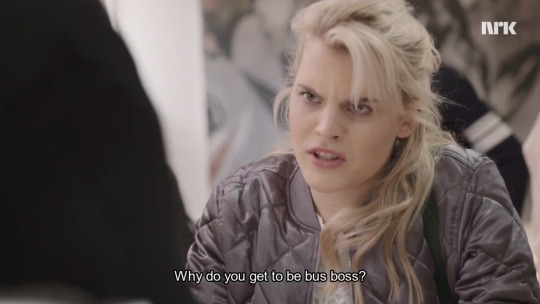
She looks angry
But she says “sana’s the boss, she’ll fix it. Remember when she fixed the toilet paper situation (in S1)?”
This seems innocent, but I think it’s a challenge
Like “You can fix it... can’t you?”
Vilde is waiting for Sana to screw up so she can take over.
In S2, Vilde talks about how much she likes William, after she saw Noora kissing him
She does this because she’s trying to get Noora to tell her about it and get a reaction out of her
So isn’t she trying to get a reaction out of Sana too?
She’s also trying to get a rise out of Sana by talking about her and Magnus
In S4E1, before Sana walks in they are “casually talking bout different shades of blue”. Everyone stops, says hi, to her, and the Vilde pipes up and says, “anyway Magnus and I have sex all the time blahh blah blah”
In her mind, maybe what she wants to happen is Sana snaps and does something, Vilde will tell the Girl Squad she’s psycho (I could see her being like “I knew from the beginning and you guys didn’t listen to me”) and then she will be the new buss boss
Was Yousef going to kiss Sana at the end of “The Best of Islam”?
First off, I’d like to say props to Julie Andem for creating potentially the most pure relationship in television history. If Sana and Yousef do get together, I feel it is highly unlikely for them to kiss or anything, so this would be a relationship fueled by purely emotion, trust, and communication, and not on physical things (of course there’s the physical want we’ve seen from Sana’s side, but you know what I mean). I’m pretty sure no one wants to see her compromise her beliefs and have sex with Yousef or something stupid like that (like Noora did with William)
I think that he was going to kiss her
they seemed to have an entire conversation that we, the viewers, didn’t understand entirely just by looking at each other.
Yousef does this tiny little head nod (timestamp: 14:24) and leans forward a minute amount, and then Sana starts shaking her head.
Then, at 14:30 he rolls his eyes a little, and says, “No?” like he was asking to kiss her, she said no, and then he was like “why am I such an idiot, she obviously doesn’t like me if she deleted me on Facebook” etc.
This would also explain why he would kiss Noora
Sana + Noorhelm drama
Eva was the first one to know about William’s knew
Sana was the only one who wanted to tell Noora
She wanted to tell her because she’s trying to protect her friend
Just like she told Vilde William wasn’t interested in S1
Noora thought that was mean of Sana to be honest with Vilde
But Noora thought it was mean of Sana to not tell her?
SANA WAS LITERALLY ABOUT TO TELL NOORA AND THEN NOORA STARTED TALKING OVER HER. In “heartbreak”, (timestamp: 5:28) Sana takes a breath and says, “Du-” (you) and immediately gets cut off by Noora saying “oh my god, if I think about him with anyone else I’m going to break” or whatever
Maybe Noora will realize this and apologize to Sana right away and it will set up Noora being on Sana’s side when she finds out about Sana being kicked off the bus?
But maybe I’m just being optimistic
Yousef and Not Fighting
I feel like the reason he stayed behind was because he didn’t want to choose sides. If we’re sticking with the theory that he knew about about Even’s suicide attempt, but the others didn’t, then this makes sense. He didn’t want to choose sides. He wouldn’t want to go out there and fight with the Balloon Squad because he obviously still cares about Even and wouldn’t want to fight his friends. But he wouldn’t want to fight with the Boy Squad because then he’d have to explain why he stood up for Even to the Balloon boys, and tell them about the suicide attempt.
What was the fight about?
My original theory: before the clip came out, I saw the BTS pics and thought maybe Magnus finds out about the SMS roulette Nudes 4 Nudes thing and dukes it out when he sees Elias. This is probably not true now that we’ve seen the clip.
Obvious theory: Mikael or Mutta, the only two outside with the Boy Squad, started a fight because they didn’t like seeing Even in a homosexual relationship. Obvious. Too obvious. Especially because the girls in the bathroom think that's why it happened.
Other: Isak threw the first punch. As we see him walking away, we see him shaking his hand. Maybe because he was shaking off blood, maybe because he was shaking off pain?
Girls in the bathroom
Like I just said, Because they think that the fight was about Muslims Vs. Gays™ this is probably not true.
Sana can’t win. According to the girls, she’s too Muslim to be on the bus and be a good bus boss... but she’s not Muslim enough to be a good representation of Islam... like... what? That conversation upset me so much.
Did Vilde snake? Or is that just false rumors? I don’t think Noora knows, or Chris, but did Eva know that they were going to throw her off the bus? She looks uncomfortable when Sana and Noora approach them and the Pepsi Max girls. Assuming they didn’t know, will they stand by her? Will they take Pepsi Max’s side?
Noora’s motivation to kiss Yousef
1. Noora did not know about Sana’s feelings for Yousef. She had already expressed interest in him, and was lonely and upset and saw him and kissed him.
2. Noora did know about Sana’s feelings for Yousef, and she was upset at Sana and wanted to get back at her. Some think that Noora expressing interest in Yousef was actually her subtly asking about Sana’s feelings for him. This seems ooc to me, but who knows?
Yousef’s Motivation to kiss Noora
This is more complicated.
Perspective: He didn’t actually like Sana, and since we’re seeing things through her eyes, she made it up in her head. He is affectionate with his friends, so he would be affectionate towards her too. (This kinda makes sense, but my Yousana shipping heart refuses to believe it)
Mama Bakkoush told him to stay away. This seems like a possibility, like after she knows 100% that there is nothing to worry about, and then she texts Sana and is like “I trust you” etc. I just feel like every time we see a kid with a religious family, the parents are always portrayed as overbearing and suffocating, and I feel like Julie is gonna give us a new look at a religious poc mom that is actually a great mom, like most of what we’ve seen of her.
The most likely thing to me seems like he liked her, and then was upset because he opened up to her in S4E4, and then she put the Balloon Boys and Evak intentionally in the same place without warning him. Or Noora told him what Sana said about him being immature etc.
Season 4 Hiatus Trailer Analysis
Who is eating the carrot?
Assuming it’s Noora, the carrot represents Yousana. She destroys it.
Assuming it’s Sana, the carrot represents her feelings. Instead of “pulling it closer”, like Yousef suggests, she “pushes it away and looses control over it.” Her feelings eat her up, and she’s stuffing all her feelings inside.
It is Isak’s black eye, someone did a side by side comparison proving it’s him.
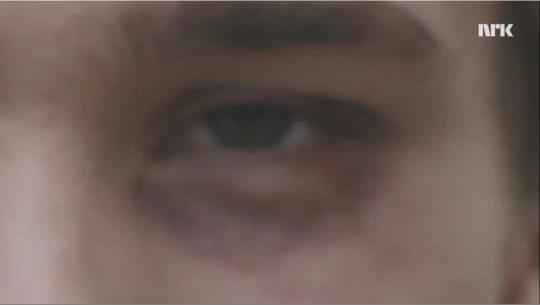
Whose hair and whose hand?
Yousef running his hands through his hair?
Mikael running his hands through his hair?
Even running his hands through Mikael’s hair? (Pls no Julie)
It looks like a male hand, so not Noora and Yousef.
I think it’s Yousef. look at how he does it in “feel it coming”
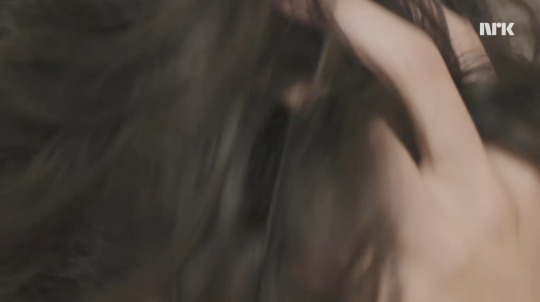
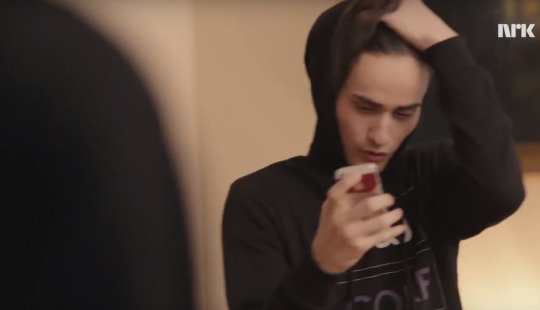
Sara’s Mouth.
She’s smiling... dos this mean she gets what she wants and Sana is actually thrown off the bus?
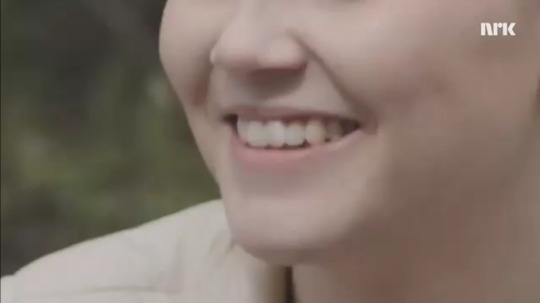
BIGGER IDEAS
Why the Russ bus is Important
It’s a symbol. Y’all are complaining that it’s getting too much screen time for something we won’t even get to see, but first of all, It’s what brought the girls together in the first place. But it’s also a symbol to Sana. It’s a symbol of her Norwegian identity.
Vilde’s Character Development / Gay Vilde
Very few side characters have gone through development. It’s mainly only been
William through the second season.
We’ve also heard of Even’s development; he hated himself for wanting to kiss boys and now he’s comfortable with himself. We didn’t actually see that though, we only know him after he’s comfortable with himself.
One could make the argue Jonas had a little development, from Jonas “you only know gay songs” Noah Vasquez in S1 to Jonas “what’s up with you dissing gay people” “he needs to break up with his girlfriend” “straight up” Noah Vasquez in S3.
Vilde is the most complex non-main character we’ve ever had, but is there even time for a redemption arc?
When I first saw the gay Vilde theory, I thought it was just people on Tumblr doing their thing and head cannoning her as gay with only 1 questionable scene as evidence but upon further inspection....
The thing that sticks out to me most is the scene in S1 when Vilde is trying to get turned on when thinking about William, she says “nothing makesme horny”. Then in S2 when are the girls are sitting on the windowsil, Noora is texting so it’s only in some versions of the subtitles, but Vilde’s back at it again talking about Noora being a lesbian. And Vilde says “I’ve made out with Eva. The feelings that arise when you make out with a girl don’t necessarily mean you’re a lesbian.” Eva replies, “What kind of feelings?” To which Vilde responds “horny”.
This post does a nice job outlining it.
Sana’s Mirror and Foil
Even is Sana’s Mirror (click here if you don’t know what a mirror is, or here to see how Noora was Isak’s mirror in S3)
Even pulled away from Isak after Isak said “I don’t want mentally Ill people in my life”
Sana pulled away from Yousef after he said “I don’t believe in Allah”
Again, God bless Julie Andem, we get to see the perspective of both sides
Even’s struggle with his past vs. his future self, and we’ll probably see him find a great balance, Sana’s struggle with her Muslim self vs her Norwegian self, which again, we will hopefully see resolved.
Noora is Sana’s Foil (click here or here if you don’t know what a foil is)
She is the epitome of the typical Norwegian girl, what Sana thinks she is expected to be like, or what she wants to fit into. The girls in the bathroom saying “wow Noora’s so pretty” Noora kissing Sana’s love interest, etc. etc.
Evak is paralleling Yousana
Evak is the foil to Vildus
I will explain more of that in a later post I will make and link to it
Parallels
Like I said, I’m working on it. It needs to be a whole separate post because this is already so long.
Themes
Figuring out who you are and who you want to be, rather than what others want you to be. In Season 1, when Eva tells Jonas that “his opinion meant more than her own, and that’s not okay.” The central theme of Season 1, reflected again in Season 3 with Isak struggling to fit in with his friends. This also seems to be making a comeback in Season 4, Sana struggling between her Muslim identity, her Norwegian identity, and her personality. She’s the kind of person who’s comfortable with who she is, but I think she has yet to find out who that is.
Everyone you meet is fighting a battle you know nothing about. Be kind. Always.
Learn to consider how other people think. Everyone has their reasons for what they do, not everyone will think the way you do, and that’s not necessarily a bad thing. Think back to Sana and Noora and the windowsill talk in Season 2, or in Season 3 when Sana tells Isak “can’t we just agree that there’s a lot between Heaven and Earth that none of us know anything about? Instead of sitting here criticizing my religion, just respect that we’ve chosen different beliefs.”
Alt er love
Predestination. In season 3, with all of the Christianity symbolism and talk of parrallel universes, we see that you can’t see the future. Every choice you make affects the possibilities for the future, so instead of worrying about what you did, and what might happen, just remember that
Life is Now.
Misunderstandings. Season 4. This is pretty self explanatory, and I’m extremely interested to see how his plays out.
Perspective. THIS IS HUGE. THIS IS THE OVERALL THEME OF THE ENTIRE SHOW, SO IT GETS ITS OWN SECTION.
PERSPECTIVE
Oh boy, here we go. The reason why the narrative only stays in one person’s perspective for a whole season is because that’s how we get immersed in the story. We don’t know more than they know, we are frustrated because we don’t know why that other person did that thing to the main. It makes everything more relatable, and hit closer to home. This ties into communication is key, this ties into misunderstandings, this ties into be yourself, this ties into Alt er love, this ties into be kind always. It teaches us that we can’t get into someone else head. We can’t make assumptions about other people. We won’t ever truly understand someone without seeing everything from their perspective.
So remember: Karma’s a bitch, be kind, always, alt er love, and life is... Now.
#skam#alt er love#life is now#be kind always#karmas a bitch#skam season 1#skam season one#skam season 2#skam season two#skam season 3#skam season three#skam season 4#skam season four#skam theory#skam theories#skam thoughts#skam translation#skam trailer#sana#sana bakkoush#isak#isak valtersen#even bech næsheim#even bech naeshiem#even x isak#isak x even#even#evak#skam evak#eva mohn
107 notes
·
View notes
Text
The Kids Who Can’t Cry
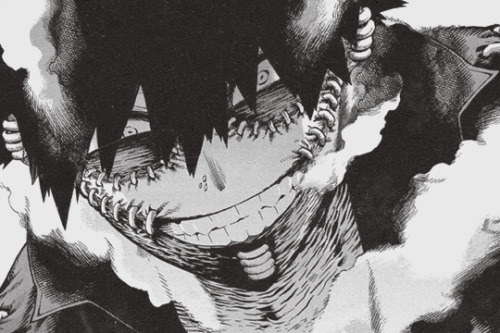


Plenty of people besides myself have pointed out this pattern, but what does it mean? Why are Dabi, Himiko, and Shigaraki essentially the main trio of the league of villains all drawn making this face? Analysis underneath the cut.
1. Shigaraki
What’s important is all three of these scenes where Dabi, Himiko and Shigaraki are all drawn smiling in the most inhuman and unsettling manner possible are all parallels to one another. In those scenes the villain is talking with the heroic foil, and trying to express themselves some way only to be misunderstood. Shigaraki is with Deku. Himiko is with Uraraka. Dabi is with Hawks.
The common point between all three scenes is that these three characters are fumbling, trying to express something inside of them. The first scene happens between chapter 68-69 when Shigaraki wonders lost in the crowds trying to find an understanding with himself.

During the scene Shigaraki genuinely talks to Midoriya and asks him what he thinks. He expresses the feelings inside of himself.
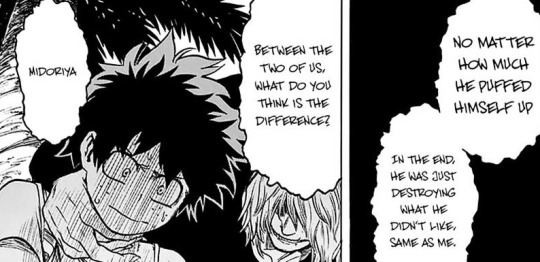
However, Midoriya describes Shigaraki as someone he can neither understand nor accept. He rejects him entirely.
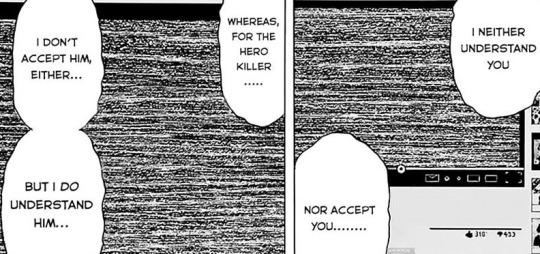
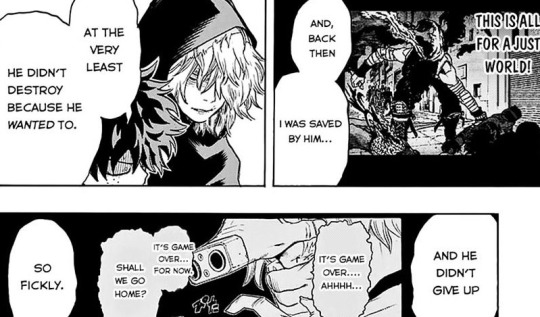
We, as the audience know all of the similiarities between Shigaraki and Midoriya. We know that Shigaraki was once Shimura Tenko, a boy with a dream of becoming a hero who was told by everyone he couldn’t. We know that Tenko once stood up to bullies and tried to make friends. It’s understandable that Midoriya doesn’t understand this, he’s not a mind reader, but there’s still a great deal of ignorance in the way Midoriya acts.
Shigaraki shows clear signs of trauma and mental illness, especially in his connection to All Migt, and yet Midoriya’s understanding of him is shallow and two dimmensional. He can’t possibly conceive of Shigaraki having any othr motive for hurting people besides “Wanting to destroy them.”
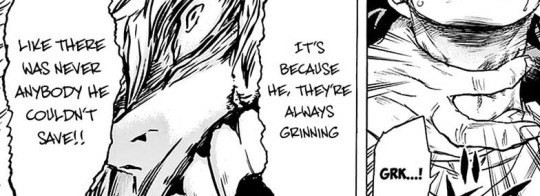
Shigaraki is trying to express himself to somebody unwilling, and unable to understand him despite all the similarities between them. This is a pattern in hero society, immediately after the UA attack nobody can conceive of a reason why Shigaraki would want to attack UA besides him being a man-child who enjoys destruction.

When Midnight suggests that somehow Shigaraki might not have gotten the same quirk counseling as everyone and that’s why his quirk is out of control and he uses it so dangerously, Vlad even directly questions why they should even bother talking about his motives.

Does Deku have to go out of his way to try to understand the motives of him and his friends? No, not necessarily. However, Deku is somebody billed as an empathic and caring character. It’s a character willing to empathize with anyone before this point showing a complete lack of empathy. To a character who shows clear signs of instability and mental unwellness. Shigaraki’s genuine signs of trauma, his itching, his fickleness, his inability to process his emotions in a healthy way just get him demonized as a man-child.

The kid who was able to see the kindness, in Eri’s quirk.
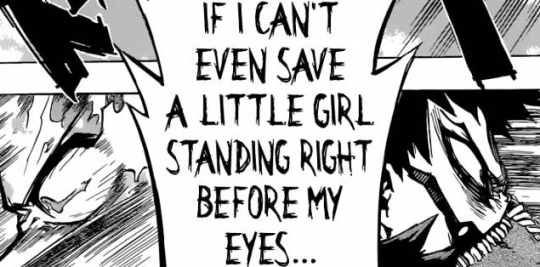
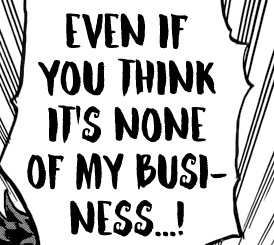
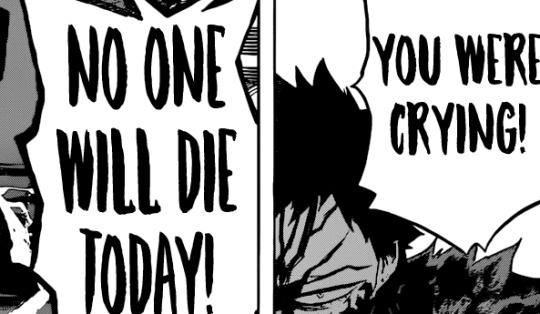
The hero who says that he can’t call himself a hero unless he saves a crying little girl in front of his eyes. The hero who says he wants to save everyone, just sort of treats Shigaraki like he’s a one dimmensional monster even though his circumstances are literally exactly the same as Eri’s. Just because Shigaraki can’t cry the same way Eri can. But some people smile when they express trauma.
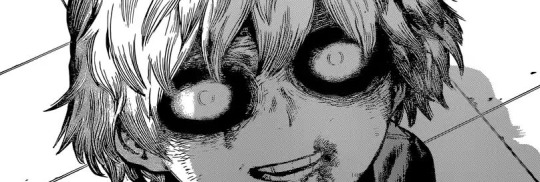
When Shigaraki experienced the worst trauma of his life, he smiled and tried to ask for help when his family just died five minutes ago, and this was used to deahumanize him and as an excuse for everyone else in the busiest intersection on the road to ignore him. This didn’t just happen to him as an adult, it happened as a kid as well, nobody helped because he couldn’t beg and cry for help, because he looked ugly instead of like a perfect helpless victim in need of saving.
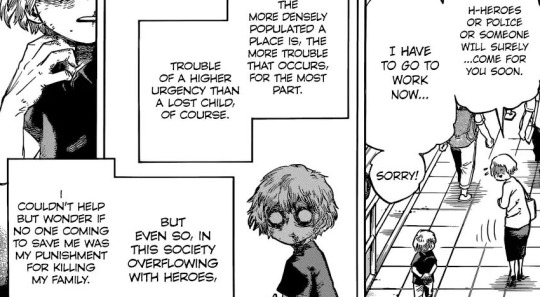
Shigaraki smiles in response to his trauma. He remembers his worst trauma, literally his family dying, and he grins. It’s literally an attempt to distance himself from his own emotions and process them because he has no healthy way of doing so otherwise. He’s trying to express himself in the only way he knows how and he gets ignored.

2. Toga
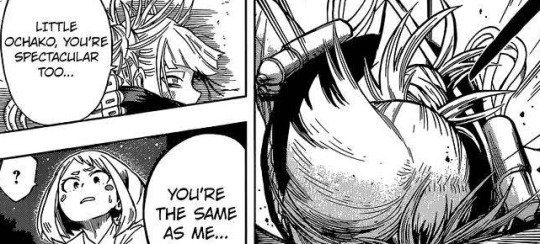
Toga acts similiarly to Shigaraki. She tries to express herself to Uraraka, tries to compare the two of them. As Himiko is much more emotionally intelligent than Shigaraki she also gives a voice to Uraraka’s innermost feelings.

Once again Uraraka doesn’t see her as a human, or try to listen to anything she’s said. Himiko isn’t a person with feelings and her own reason for doing things, she’s just a psycho.

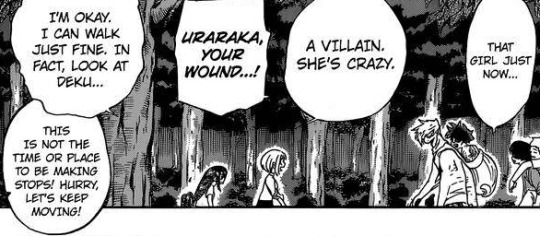
Even though Himiko is really perceptive of Uraraka’s own hidden feelings the same is not true the other way around, even though we know that Uraraka is a very kind, emotionally intelligent girl who is always noticing the pain on other people’s faces she loses all that perceptiveness when dealing with Himiko.

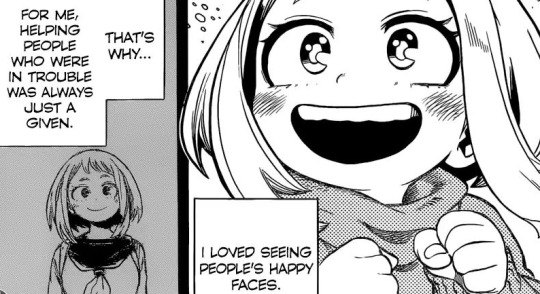
Does Uraraka have to empathize with a girl literally trying to stab her and suck her blood? No, not necessarily. However, at the same time this is a character we are told always goes the extra mile to understand people, notice their pain, and always being motivated to help just kind of ignoring Himiko.
This relates to Himiko’s backstory as well. What was Himiko explicitly told to do by her parents? Always hide her pain. Always keep herself hidden for the sake of blending in. Wear a fake smile and be a nice, normal girl.

Himiko couldn’t even cry when she was sad and alone. She had to repress everything for the sake of being normal, for the sake of being acceptable to others, and now she doesn’t know how to anymore.

Himiko at least tried to be normal, tried to express herself in normal ways only to be misunderstood by everyone around her and is continually misunderstood and dehumanized even now. The easy life she wants is just the normal life that everybody else has, the one a normal girl like Uraraka has. But she doesn’t know how to express that, and Uraraka who has not been traumatized in any significant way doesn’t really understand what she’s been through. She can’t.
3. Dabi
We finally get to Dabi and his foil Hawks, where we can see not only is Dabi misudnerstood like in the previous two examples but his feelings are outright denied. Uraraka and Deku are ultimately both children, it’s understandable they don’t get the feelings of villains who have tried to kill him but this.

Hawks is not any better than Dabi in this situation. He just murdered Twice in cold blood right in front of him, but even though Hawks is actively the agressor in this situation look how he treats Dabi.
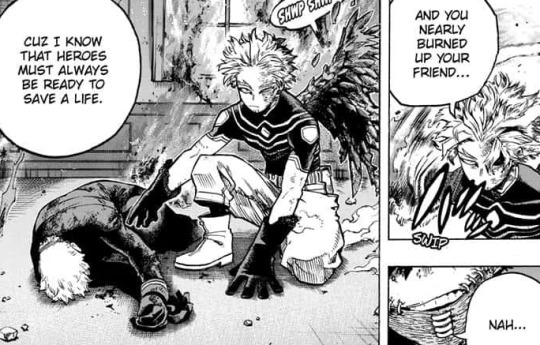
He accuses Dabi of nearly killing Twice, even though not only did Dabi show up to intervene for Twice’s sake, but he showed up to rescue Twice, from Hawks. The sheer gall of Hawks to try and kill twice but at the same time accuse Dabi of being the one to put Twice in danger.

The way they interact is completely different. Twice is someone who trusts Dabi. Dabi literally puts himself directly in between Hawks and Twice so Twice won’t get harmed any further. Yet, Twice still sees himself as the hero in this situation. Even while actively harming, and trying to kill Twice in his head he still thinks of himself as saving him.
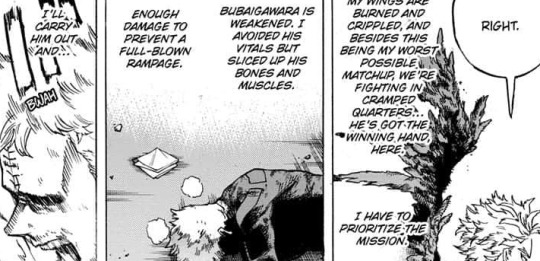
Then after murdering Twice in cold blood after going on and on about how he was avoiding his vitals, and how he was going to carry him out of here and save him, when he’s directly confronted with Dabi’s anger over his dead friend, Hawks invalidates those emotions.

You’re not sad because you’re smiling. Hawks says. Hawks, literally the person who killed Twice, right in front of Dabi, then criticizes Dabi for not being appropriately sad about it. This is when Hawks has expressed no remorse for what he has done.
In his own head, Hawks is the hero and Dabi is the villain. Hawks feels guilty for his own actions. His own inhuman ability to shut off his own emotions and do what must be done. However, Heroes don’t kill people. Hawks must somehow remain the hero. He must be the one who is right. Therefore, he blames Dabi as the villain. Dabi is the scapegoat. Dabi is the one who was wrong. Dabi is the cold blooded killer even though he has done nothing more than try to protect his friend.
Dabi must be evil, must be a villain so that Hawks can be good. Hawks has to justify his actions and emotoins by dehumanizing the person in front of him. It’s not about Dabi at all. Dabi’s emotoins don’t even factor in or matter. It’s all Hawks self justification and the narrative he tells himself where he is the hero doing the right thing. And this is something that appears in Toga’s fight against Curious too, the villains literally have to fight for control of their own narrative, to be able to tell their story about their trauma in their own way because the heroes will always try to render it in easily digestible forms. They can’t be people, complex, messy people they must either be categorized as hero or victim.


Toga can’t be a normal girl, she has to be a martyr. Toga’s own feelings or opinions don’t matter. Hawks goes one step further and suggests that Dabi doesn’t even have feelings, he’s not even properly sad that his friend is dead.
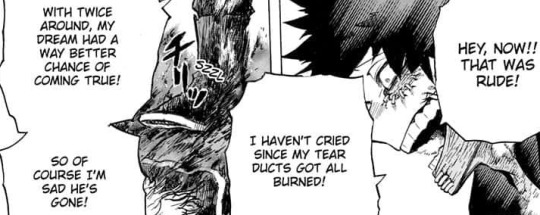
Which Dabi finally replies with what is true for Himiko and Shigaraki. It’s not that he doesn’t want to cry, he can’t cry. Heroes continually confront villains with their actions and act like they feel no guilt at all, like they’re heartless psychopaths and treat them as such when the manga has shown us again and again the opposite.

Even if Dabi was crying his eyes out it wouldn’t matter though. Jin was crying, and that did not stop Hawks. The heroes who view themselves as heroes, who view themselves as empathic and good people who would never ignore a cry for help all stop acting that way when confronted with Shigaraki, Himiko and Dabi.

It eventually crosses a line into deliberate ignorance. It’s not seeing those on the other side as human beings, which is dangerous because it can literally turn murderous in the case of Hawks and Twice. It’s cries for help that go ignored because they’re not presented as easily digestible narratives. It’s a breakdown in empathy in a story where the stated goal of the main character is to be a hero who “never loses, and saves everyone.” There are people not being saved. There are people who are not being helped because they can’t ask for help.
Thanks to @savetenko for pointing out this parallel to me here!
#shigaraki tomura#himiko toga#dabi#todoroki touya#shimura tenko#uraraka ochako#midoriya izuku#hawks#keigo takami#league of villains meta#lov meta#mha meta#my hero academia meta#my hero academia theory
594 notes
·
View notes
Text
Here a Witch, There a Witch
Witchhood, Celica’s Act 5 arc, and Treatment of Women in Echoes (aka several thousand words of musings. Coherency not guaranteed. Spoilers of course.)
I find the narrative choice of turning Celica into a witch who is then saved by the intervention of Mother Mila a really weirdly interesting one?
First off, I skimmed the Gaiden script and this doesn't happen. This is probably the weakest part of the whole story for me in Echoes, and, in Gaiden, it's even more confusing.
Jedah: Alm's trapped in Dragon Mountain. You must want to save him. If that's so, then follow after me. If you offer yourselves as sacrifices to Lord Doma, Alm's path shall also open up once more!
Witchhood, the soul of a Branded child, Duma needing both Alm and Celica, all of that isn't spoken about, so it's not certain what exactly Jedah is doing all that time. So it's literally a game device to force you onto a linear Alm path. At the very least, turning Celica into a witch makes a bit more sense if you assume that there's some equal power exchange, which Jedah hints at. Celica's soul, her Brand, her magic, all are things valued by Duma, namely strength. Taking both Celica and Alm’s soul would restore Duma to a sanity and power he’s been lacking for ages. Okay, sure.
The idea of sacrificing your humanity for a love one is supposed to foil to Rinea and Berkut (and to a smaller extent, Jedah and his daughters, probably). The idea of witchhood is so interesting because you get many different 'witches' in the game. You have those that chose the contract of their own accord (Nuibaba) and kind of exists outside of Jedah's faction. You have the witch sisters, which Sonya says it was Jedah's sacrifice to Duma that turned them to witches, but Jedah counters her, saying they offered up their souls willingly. You have Delthea who for all intents and purposes gets witch like powers when controlled by Tartarah. Finally you have Celica who, even after having her soul offered up to Duma unwillingly, is controlled but also is mentally present enough to tell Alm to kill her.
The idea of men sacrificing women for power is one that happens a lot in this game. The villains, Fernand, Berkut, Jedah, all destroy their relationships with women in their lives and women who reject notably megalomaniac men survive (Sonya, Mathilda). The masculine and feminine dichotomy of Duma and Mila is pretty slanted towards the Father who destroys and the Mother who gives life. This is echoed in the paternal relationships in Echoes (Rudolf + Alm, Lima + Celica) all being quite toxic ones while the maternal ones (Liprica + Celica is the most significant, Mother Mila being redeemed is another example) having positive connotations.
(Side Note: Given the eternal sleep of Duma, Sonya, no matter what her ending suggests, could not have become a witch by offering up her soul to Duma. The ending therefore, one could argue, is simply trying to demonstrate the futility of retrieving souls already sold, and Sonya could have easily taken up residence in Nuibaba's manor with ill rumors abound.)
(Second side note: The time when Alm is saved by Celica's pendant, notably that comes from Celica's mother as one of the gifts. Was it meant to protect Celica against the influence of witches? Lady Liprica did not want Celica to stand in front of Mila - did she fear Celica to lose her soul to not a god but a goddess? Was Celica's giving nature what allowed Alm to succeed even when he wasn't prepared for Duma's true might, possibly crippling her own protection in the self-sacrificial nature she had? The last one is almost certainly a yes.)
You also have quite a bit of 'liberation' through the protagonist's part (Delthea, Mathilda, Celica) in contrast to the hordes of witches that you can't save due to their lost souls to Duma. So why can you save who you can save?
Berkut and Rinea are easily understood. Berkut volunteered himself up to Duma, Rinea, being sacrificed but also unwilling to leave Berkut's side, is unable to be redeemed. Simple enough.
Delthea is controlled not by Duma but by Tartarah and notably against her will. Upon killing Tartarah, she's freed - so attempts to create witches can be thwarted through destroying the arcanist controller. Also- the soul didn't actually get to Duma in this case. Nuibaba did not actually sell her soul to Duma. Her contract was with Medusa and she's referred to as an arcanist despite her witch class.
Marla and Hestia - it's hard to tell if you can believe either Sonya or Jedah's story as the total truth. They were almost certainly coerced on some level, but Hestia mentions that she should have lived her life freely like Sonya. Again, a scrap of her own personality and some hint at a decision she made? It's hard to tell, but it's likely we couldn't save them because again, there was something in their process of becoming a witch they couldn't recover from. Did they make that decision out of their own lust for power? It’s likely.
Now to Celica, the strangest of the potential witches, not only does she get her soul returned to her- it's through stabbing her with the Kingsfang/the Falchion. She gets her soul returned to her despite Jedah being convinced her soul is already devoured. How on earth does Mila have Celica’s soul if Duma has taken it?
Well game logic suggests that by killing Celica, Duma loses her soul. You see this with Berkut and Rinea, in death, they are freed from Duma’s control. Suddenly, Hestia’s last words make sense. Duma’s not all-powerful.
In the same vein, Mila finally gets over her fear of selling out her brother. Of note, Duma never used the Kingsfang on Mila and Mila never took an advantage to kill her brother. They fought bitterly but they also, like overgrown siblings, never wanted to kill each other. They were, in some ways, too proud and far more concerned with their own interests rather than those of humans’.
So maybe from this viewpoint, it makes sense how Celica’s self-sacrifice spurs Mila into finally releasing her seal on Falchion and entrusting her brother’s fate to someone who was able to do something she could never bring herself to do - trust in her opposite and sacrifice each other for the greater good.
Of note, in Gaiden, instead of the witch dialogue, you get this:
Cellica: It won't work. Judah possesses some mysterious power that's obstructing all our attacks. Besides, countless Bigles keep coming to entangle us. We can't even move anymore. We're probably already done for... Sorry, Alm. I wasn't able to do anything for you after all. I've had a strange premonition... A feeling that something terrible will happen to you... That's why I came this far on a quest to rescue Mila... That's why, until then, I didn't want you to fight. Because of that... I acted so cold. I'm sorry... The truth is, I've always...
This is after the crypt. I mean logically, this is because the game wants you to play as Alm as the hero and Celica now steps into a role similar to Zelda in TP - both a maiden to be saved as well as the wise queenly character to aid the hero. What's interesting is Echoes actually plays up Celica's self-sacrificial nature and her inherent importance, because of the part about giving up her soul. Gaiden's Celica actually makes less sense - she has no plan, she is just feeling defeated and like she failed Alm. Even if Echoes Celica makes a bad decision, she's takes action that makes a lot of sense for Celica at this moment - that is, a Celica abandoned by her goddess and used to bearing a lot of survivor guilt about her existence as princess.
For comparison, the Echoes dialogue goes:
Celica: Back on the island, I had a dream. A dream where something terrible happened to you. So I decided to petition Mila for the strength to protect you. Yet for all my travels, you’ve still faced terrible danger. And you were even forced to end your own father’s life. …I’d seen it all. I knew it was coming, but I couldn’t change a thing. I failed to keep you safe, Alm! Alm: That’s not… Celica, none of what’s happened is your fault. You’re not to blame for any of it! Celica: But I won’t lose you… I won’t let any of you die! I don’t want you to fight Duma. I don’t want anyone to be hurt or killed. That’s my only desire in this life.
Why did Celica believe Jedah? A lot of people kind of groaned when she bargained with Jedah, but I think, stepping back for a moment, looking at how Celica views the gods is important. Even if she doesn't agree with Duma, she still reveres him. Her ending dialogue with Duma is pretty much that. She recognizes what he did for Valentia but seeks to free him from his madness. However, at the beginning, she believed if the gods were lost, the land would become barren and humankind would surely die. She's not at Duma tower to kill gods, she's at Duma tower to retrieve a god and restate the natural order of Valentia. Celica, who was looking for Mila in order to circumvent the sufferings and the destruction of humanity, of course would turn herself into the problem. It's not that she trusted Jedah, but I think Celica at this point had been coping with a vast body of knowledge and pressure about the gods and their effect on the world that Alm never really considered. She makes a hard decision in absence of her own faith and confidence, in her eyes, a choice that would protect everyone.
The problem is Rudolf, in moving against the Duma Faithful, has already broken the Accord and set in motion events that means Celica's mission is a failure. The gods HAVE forsaken her. Mila notably doesn't come to her senses until the two branded children are about to kill each other in front of her. (Honestly, I think the Fire Emblem team has a small fetish for stabbing your loved ones, especially under possession. Awakening flashbacks anyone?)
Celica upon seeing Mila in stone, has a crisis of faith essentially stalls her entire arc. Is this weak writing? Yeah, it really is. Celica’s arc lacks its personal climax. Alm has his Rigelian heritage and Berkut on top of this. Celica’s arc gets absorbed into Alm’s. Celica needed something else to restore her faith in herself, especially after her mental surrender.
Is the answer faith in loved ones? Partially. That part is already in the game though.
Celica: I do. It’s as Mila said… We’ve had the strength to live and fight for our world this whole time. I lost faith in that somewhere along the way… But right now, it seems the most obvious thing in the world. I trust in mankind like I trust in you, Alm. Absolutely, and without hesitation.
The issue I think that would resolve this best would be actually in how they handle Mila. What would have strengthened Celica's final decision would be Mila reaching out to Celica rather than Alm, acknowledging how it was Celica that uncovered the mystery of where she was, came all the way to save her with her own, very human powers. That her journey to Mila gave her a greater wisdom and understanding of the relationships between gods and men that Alm couldn’t have known.
Isn't that a kind of strength even the gods couldn't predict?
#fe15 spoilers#fe echoes#celica#alm#mila#fe gaiden#arget rambles#my meta#duma#what even is this#feel free to talk to me about this#as much as I love this game#and the emotional arc was super punchy#I think the way they handled this was just#good bad weird and yet still emotional#so who even knows what's going on#maybe I just need to write fanfic or something
15 notes
·
View notes
Text
Kumagawa + Ajimu = 0
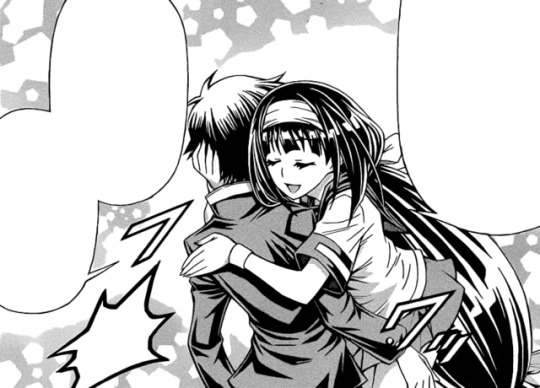
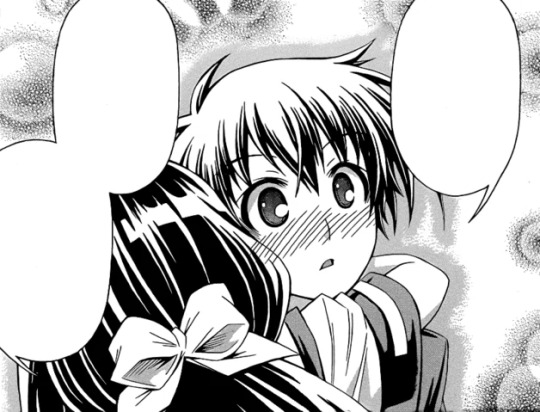
Medaka Box is a school battle manga that isn’t at all about fighting. Instead it’s about how the characters connections to other people humanize them. How abnormals, are no more than normal people when they connect with others. The greatest example of this in the manga is Medaka and Zenkichi, the superhuman girl who becomes human through her connection to her normal and everyday best friend.
Medaka and Zenkichi have been together their entire lives, to the point where they both sort of build their identity around each other. Medaka was only able to see herself as a person because Zenkichi saw her as a girl first and not a genius. In other words as Medaka says, you’re the person that made me, me. Medaka’s most formative memory is not with the people who praised her as a genius or showered her in affection, but with the one person who always treated her like normal.

However, this post isn’t about them. Instead of looking at one of the most positive relationships in the manga let’s look at one of the most negative ones.
Medaka and Zenkichi build each other up, but Ajimu and Kumagawa destroy each other. Ironically for the exact same reasons. Kumagawa and Ajimu are also the only ones who treat each other as humans, and they aer both at their most human and vulnerable when around each other, but unlike in Medaka and Zenkichi’s case this is what leads them to hurting each other.
This is because Ajimu is a shadow of Medaka, and Kumagawa a shadow to Zenkichi, and they were both built as characters to foil a more negative aspect to their counterparts, and even in their relationship to each other reflects Medaka and Zenkichi’s like a reversed and inverted image in a mirror.
Instead of talking about two good children let’s talk about two terrible brats.
1. Kumagawa and Zenkichi
Kumagawa and Zenkichi are both untalented people who want to stand out amongst the talented and special people. However, the differnce between them is not something so simple as Zenkichi works hard, and Kumagawa is lazy and always tries to take the easy way or cheat his way through.
The light novels even say so. That Kumagawa is a hard working person that always puts all of his efforts into everything he does.
When he took up the position of Student Council President, I hadn’t expected it at all from him, but unexpectedly, as if he’d had prior experience, Kumagawa-kun properly completed his Student Council President duties.
He did his work in an unpleasant, indescribable manner that could really only be described as “completed”, and it was a very unpleasant manner from the point of view of a General Affairs Manager, but even so, even if the work couldn’t be considered splendid, I couldn’t deny that Kumagawa-kun was truly a hardworking person. [x] translation by @polaristranslations
The difference between them is Zenkichi’s efforts have always led to self improvement. They get rewarded. He always progresses forward as a person. However, Kumagawa’s efforts never get rewarded. He never improves, he only gets worse, he only spirals down. Zenkichi could be given one thousand tries and make it on the 999th time. Kumagawa would go all 1,000 tries without ever winning once.
In the first place, even if you got infinite lives as Mario or as Luigi, you’re someone that still wouldn’t be able to defeat Bowser—but still, since you ended up dying anyway. [x]
Internally, the characters are almost the same person. They’re both relatively normal guys who try their hardest at whatever they do, and they both have aspirations to be among extraordinary people. Zenkichi wants to keep up with talented people because he believes that makes him worthy of Medaka. Kumagawa wants to keep up with talented people because he believes the world only allows talented people, or people who are strong to be safe and happy, and he idealizes it as an escape from the constant chaos and misery of his life, while at the same time feeling spiteful towards them because he’s left out.
This is what Kumagawa also tries to get Zenkichi to understand about him in their first fight. Zenkichi and Medaka’s views on people acting out of trauma, or bad victims are a little bit black and white, they can’t possibly udnerstand why someone would want to lash out and hurt others.
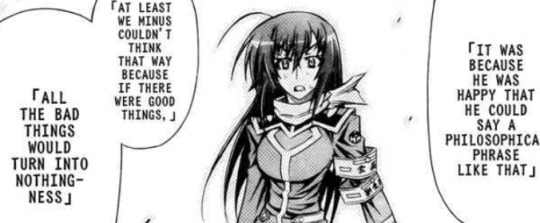
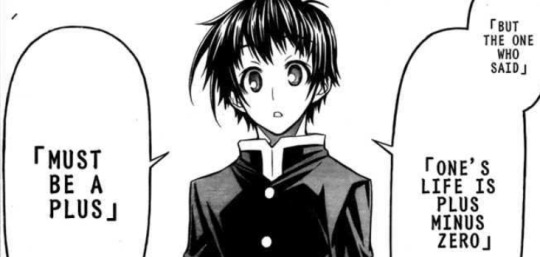

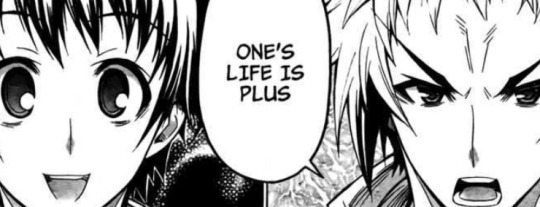
You know how a lot of people misinterpret Catcher in the Rye as the main character being unlikable, just because he presents his trauma in unlikable and not straight forward ways. Because he doesn’t directly ask for help, but rather conceals his trauma and rambles around the point. Because he at no point cries out help me like a victim? Therefore people have a difficult time seeing him as one.
That’s basically Kumagawa and Zenkichi’s entire relationship. Zenkichi cannot accept Kumagawa, because Kumagawa never asks for help in straight forward ways. he never presents himself as a beautiful victim to save. In reality thought, Kumagawa is Zenkichi, just with a lot of trauma piled onto him. Kumagawa is aware of this and tries to make Zenkichi understand, but Zenkichi just doesn’t.


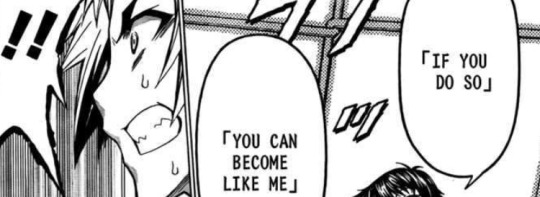
This is even lampshaded in an omake. That despite pretending to be the most terrible villain he can possibly be, Kumagawa’s personality is weirdly friendly and approachable once you get to know him. It’s because unlike Medaka, Kumagawa actually values the people around him as individual people. He values close connections instead of just trying to blankely love everybody. Which is what Zenkichi’s strength over Medaka is as well. They both are people that can connect to others on a personal level, they can harmonize others around them and their greatest strength is how they use that as a group rather than being individually strong on their own. Neither Kumagawa or Zenkichi actually need to be all that strong because their strength comes from empathy and their ability to understand other people.
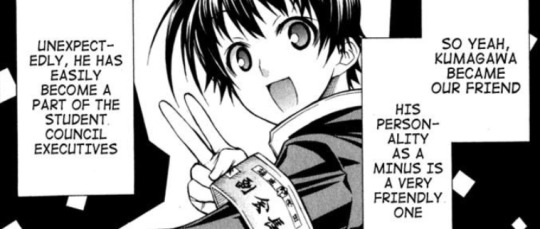
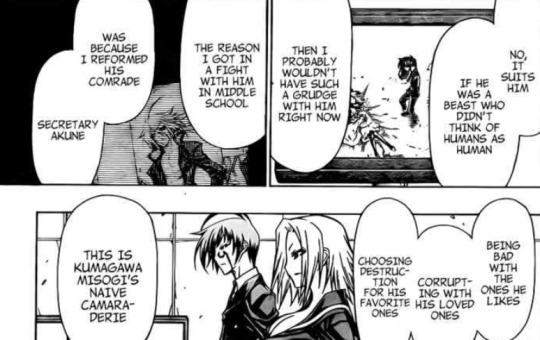
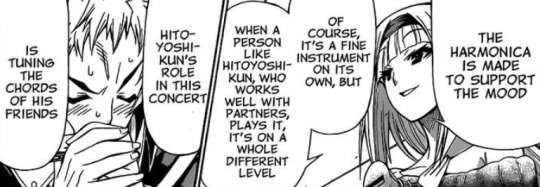
They’re both natural support characters who think they have to be the ones fighting on the front lines. They also both lose most of the fights they get into, Zenkichi’s only real victory is against Munakata at the start of the manga. Even when he beats Nianami, he says he’s still the weakest member of the group. When he goes to the jet black birdal ceremony to save Medaka, he completely fails to save her and gets stabbed and becomes a hostage instead. Even both of them are essential to Munakata’s development, as Zenkichi becomes his first friend, and Kumagawa becomes the first person that Munakata ever killed. They both go out of their way to try to help him, but in opposite ways, Zenkichi as a friend, and Kumagawa helps him by making himself a victim to Kumagawa’s killing instinct.
They’re constantly comapred to each other in the manga, and they constantly act in opposite ways trying to accomplish the same thing at heart. Zenkichi even understands Kumagawa even when he pretends he doesn’t.

Kumagawa is obsessed with cleanliness because he sees it as a relief from the constant chaos of his life, because he thinks he’s forced to love ugly, and unpleasant things because that’s all he will ever see. Zenkichi sees through him because he shares that same obsession, he acts like an average guy who doesn’t want to be dragged into the extraordinary but he loves beatufiul people, he’s obsessed with Medaka and part of him still sees her as something above the ordinary instead of treating her 100% like a normal girl. They carry the same contradictions within each other, it’s just for Kumagawa they blow up in his face a lot harder than they ever do for Zenkichi.
They both loved Medaka. They both met Medaka when she was two years old, and tried to give her an answer to the meaning of her life so she would stop worrying.
You could even say Kumagawa is just Zenkichi without a Medaka in his life, but that’s not entirely true. Kumagawa has a Medaka, it just happens to be Ajimu who is terrible.
2. Medaka and Ajimu
Ajimu is the logical end result of Medaka’s ability to infinitely copy and gather skills. She now has quadrillions of them and is basically undefeatable. She too, like Medaka is a character that never has once lost in her life, the same way the main character of a manga never really loses. For both of them their incredible talent over others makes them feel completely inhuman and alienated from all around them, Ajimu just pushes it to an absurd extent crossing the line and becoming a “Non-human.”
They also both are trying to pursue insane goals when they meet each other. Ajimu wants to create a perfect human, and Medaka wants to make everyone happy. Not because they genuinely want those things, but because they both want to fail. Medaka wants to be human and feel like she’s equal to everybody else. Ajimu wants to fail and prove that reality is real in front of her and alsot hat she’s a part of it.
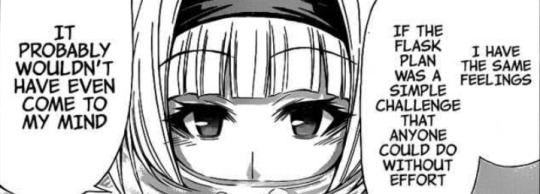
They’re both absurd girls, and absurdly lonely. They’ve lived their entire lives in almost complete isolation because no one has seen them as human. It’s just Ajimu has accepted that declaring herself a “Non-Human” whereas Medaka struggles with her desire to be a normal girl. If you think about it nobody in their lives has ever seen them for them. Medaka’s father sees her as an heir who has to take over his entire company the moment she turns eighteen, her other father saw her as a replacement for his sister, his brother obsessed over her to the point that it was creepy, every adult around her either put her on a pedestal or they thought she was terrifying and blamed her for their own inadequacies. The only person she had in her life who remotely treated her like a normal girl was Zenkichi.
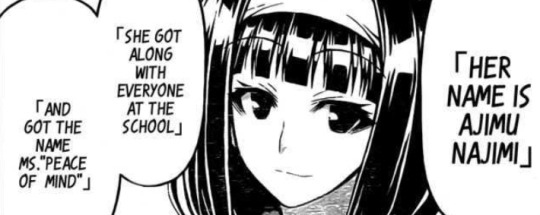
Ajimu was someone who can get anybody to like her in the whole school.
「She hadn’t been such a sadistic character in the past… What happened to the kind and considerate Anshin'in-san that everybody loved…」
“……?”
He was giving off a rather timid aura, which was unusual for him. [x]
Because if everything is fake then, Ajimu can act however she wants. If they’re not real people, if they’re just programmed npcs then she can just pick the right responses to gain points with them. That’s why Ajimu is equally capable of being a very caring and loving person, but also cruel and sadistic. Neither of them are the real her, she’s equally both because she has nothing to ground her personality on, she doesn’t see other people as people.
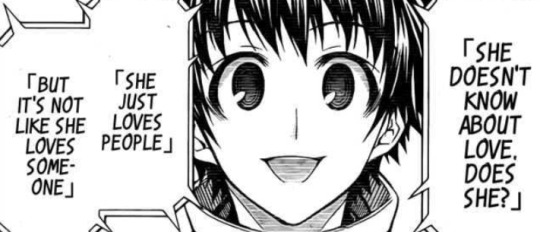
Which is exactly what Kumagawa calls Medaka out on, which happens immediately after he reveals how his “love story” with Ajimu ended. Both Medaka and Ajimu have a trouble seeing other people as people due to how much they have been isolated and put on a pedestal their entire lives. However, both of them are both afraid ot come down from their pedestal as well and admit they’re wrong. Their entire identity is built around being girls stronger than anyone so who else would they be if they weren’t that?
Ajimu is just the negative result of such an attitude. Medaka is preechy and looks down on other people, but it’s never treated that seriosuly as a flaw by the plot. It’s always looked on as something well intentioned and misguided, but ultimately just something she does out of ignorance. Whereas, Ajimu has full on malice for the people she doesn’t see as people.
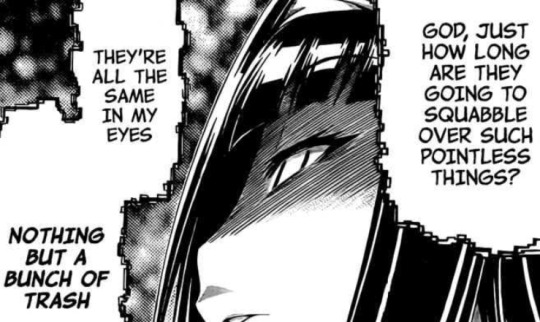
Ajimu’s complete apathy for other people causes her to treat others terribly. She carelessly tears Medaka and Zenkichi apart, throws everything into chaos, basically because they’re her toys and she wants to play with them. The only reason Ajimu ends up not killing anybody is because Ajimu herself doesn’t really care enough about anybody to kill them.
Medaka’s ignorance of other people, becomes complete and utter apathy with Ajimu. Her inability to love someone as an individual becomes Ajimu’s complete and total inability to see people as even real, or anything other than manga characters.
They both ultimately live empty lives that leaves them some form of suicidal. Medaka wishes she had never been born, and Ajimu wants to kill herself out of boredom.
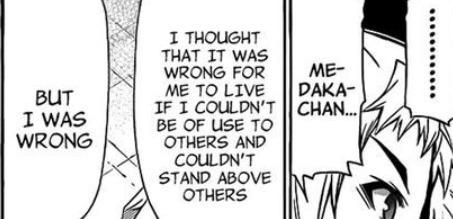
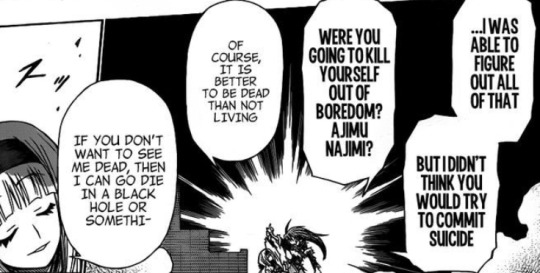
What both of them want desperately is to be equal to other people, and to stop being alone, but also neither of them can let go of the fact that they are special and they think they have to stand above others which is what creates the central conflict in both characters. It’s just that Medaka believes life is epic and keeps trying to learn how she can live, she keeps growing, whereas Ajimu like Kumagawa just spirals out of control slowly and becomes more minus, more negative.
That’s why in the end Medaka is the only one that can stop Ajimu from killing herself, because Medaka is Ajimu, she has those same suicidal feelings and can understand them.
3. Kumagawa and Ajimu
What exactly happened between Kumagawa and Ajimu in middle school is never fully revealed, despite being so formative for many of the conflicts of the plot. However, there is a lot of subtext for what their relationship was and almost none of it is pretty.
The most defining moment of their relationship is that Kumagawa ripped her face off. If you think about Medaka and Zenkichi as two people who humanize each other, who give each other their identity than Kumagawa did the opposite. The face is the sign of identity. When Kumagawa ripped it off, not only did he destroy her identity, he also made everyone else forget about her.
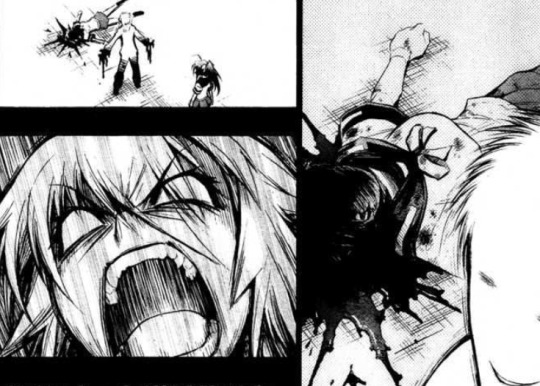
Another thing is Ajimu appears to talk with Kumagawa every time he dies, and this close proximity to her is something that makes him hate her as much as he loves her.
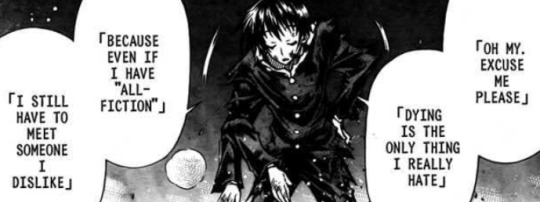
It’s a pretty clear metaphor for being trapped in a relationship that’s bad for both parties, that makes you eventually start to hate the person you love specifically because you feel trapped by them. Their relationship is something that contributes to Kumagawa’s misery, but at the same time it’s something Kumagawa cannot let go of because if he does not he’s afraid Ajimu might die.
Kumagawa was doing to Ajimu what Zenkichi did to Medaka when they first met. he was trying to give her a reason, any reason to live. However, his way of saving her life was to screw her down and steal away both her face and her freedom. That is to say he made her even less of a person that she normally is.
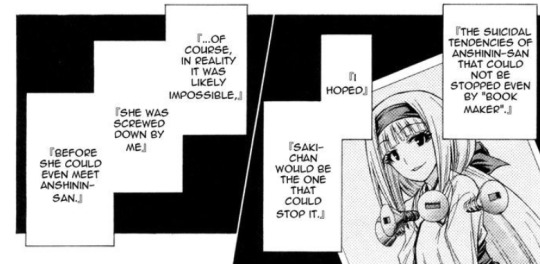

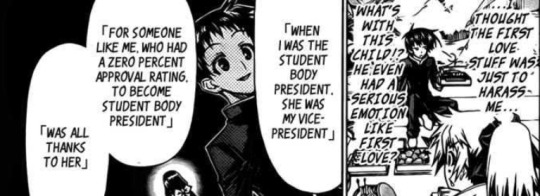
The general story we know is this. They met in middle school, and during that time both of them kind of experienced a “honeymoon phase” of their relationship. Kumagawa was able to feel like a normal person around her because Ajimu is just that competent at getting along with others, and at that time he basically existed to do everything she said.
Even though you’re sitting arrogantly atop the seat of Student Council President, you’re nothing more than her puppet.
You may have heard the term “puppet government” before, but right now, you’re actually making that a reality—just like our time in middle school, our time at Hakobune Middle School.
That time—that time you became the Student Council President with a zero-percent approval rating, you had basically turned into a yes-man for me, the Not Equal. [x]
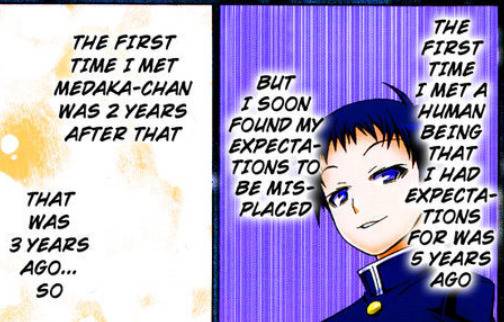
Ajimu says the first time she had expectations for another person, that is the first human being she struggled to try to see them as human was Kumagawa. However, something goes wrong most likely due to Ajimu’s suicidal nature and Kumagawa’s wish for her to live.
My guess is that on that “day” we never got to learn the details of, Ajimu threatened suicide first and Kumagawa retaliated. Or, Kumagawa knew she was suicidal all along and he was terrified of losing her and over the course of two years those negative feelings built up until Kumagawa finally broke and acted up.
At which point they both broke each other irrepably. They started being terrible to one another. Kumagawa is specifically referred to as having trauma that outweighs all the other trauma in his life and it’s triggered when Emukae takes both of the exploding bracelets and almost commits suicide right in front of him to save him. In other words he had trauma with girls he loves comitting suicide. It’s also the one thing he’s afraid of, like when he asks Gagamaru to kill him because he’s too afraid to just jump off the roof on his own.

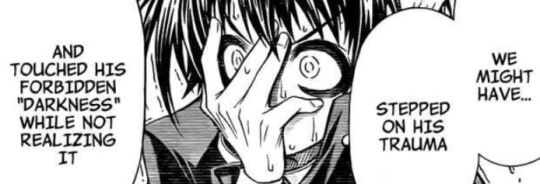
When Kumagawa is describing all the negative things he has to accept in his life, he says it’s like accepting a lover. Which indicates a very unhealthy view when it comes to accepting the flaws of a lover in any relationship that you’re in.
Like some of the examples he lists are just, stuff that would happen in a relationship gone wrong.
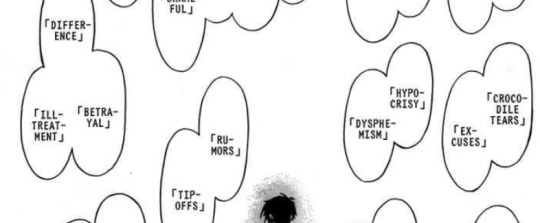

The reason it went wrong being in the end, Kumagawa and Ajimu unlike Zenkichi and Medaka are too similiar, they’re both too afraid of being human. It’s even implied they both hold the same kind of cynicism and minus forms of views which is why the understand each other so well.
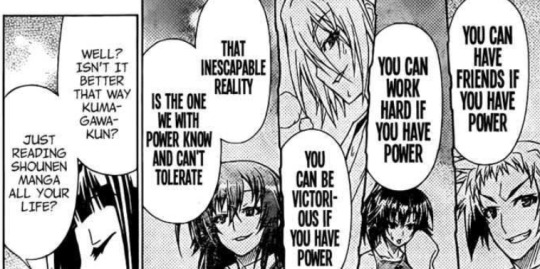
They both see the world as an inescapable reality that’s not for them, where they don’t belong. Kumagawa because he is too weak, and Ajimu because she is too strong. They are on complete opposite sides of the spectrum, but that is how they connect with each other, because the world is not for them, it’s like they’re the only two people in the whole world.
It’s Ajimu and Kumagawa who make all the metafiction jokes, about treating real life like it’s a manga. And that’s a form of using fiction as escapism. Ajimu believes everything is fake, because the reality is that everything is unbearably lonely for her. Kumagawa uses fiction to escape, because the reality is life isn’t like shonen manga and tragedy upon tragedy is going to keep happening to him and it doesn’t matter if he’s strong or week.
They both have this desire to become human the same way everyone else is. They both feel left out from other people’s happiness. However, they also both have the desire to escape, to run away, because things are too painful, too lonely for them and they can’t handle it.
Which is why ultimately both Kumagawa and Ajimu can’t work together, because neither of them wants to be human because being human is vulnerable. Zenkichi even comments this, Kumagawa doesn’t want to be understood, not really, or at least not the way he presents himself. He tries everything possible to make others fail to understand him.
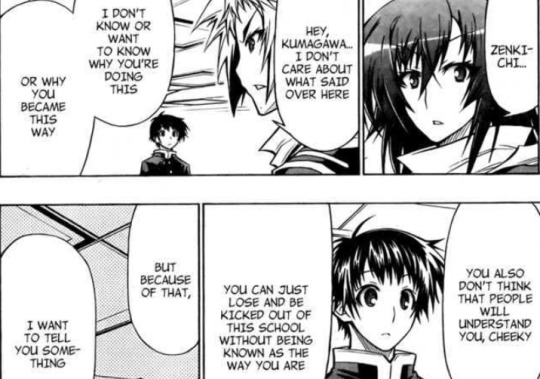
Ajimu too, distances herself from reality as much as possible. She even calls herself a ‘non-human’ all the time, not because she’s some weird space alien, but because she does not want to be human. Neither of them wants to get hurt, to feel pain the same way that humans do.
Which is why they can’t work around each other. When they’re together, they both know each other so well, they both fit so naturally together, that both of them become vulnerable in a way that neither of them can handle. Kumagawa even says as much, though he presents the notion in the most warped and twisted way possible. That he saw through the fact that Ajimu was just pretending to be kind and to get along with other people, and none of that was her real self, and he tried to see through the mask. It worried him that he didn’t get to know the real Ajimu. Kumagawa at least at one point didn’t want to love the Ajimu that was kind to others, he wanted to love the real her.
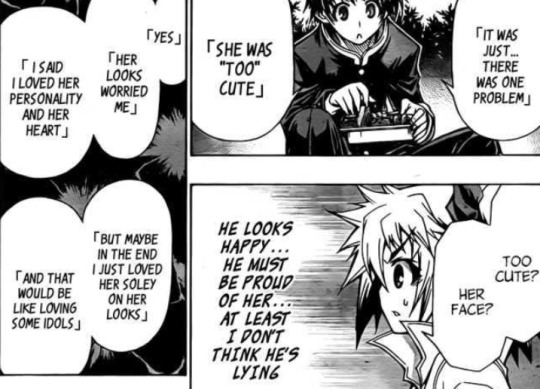
But in the end Kumagawa has no idea if his feelings reached or even mattered to her. When he says as much it’s the one time Kumagawa looks genuinely sad during this entire conversation, and the panel hides his expression.
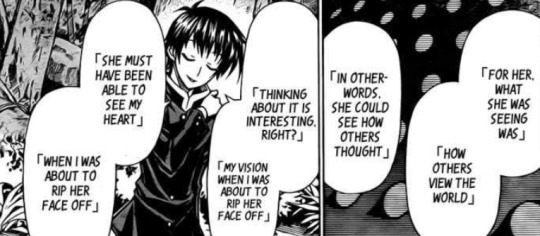
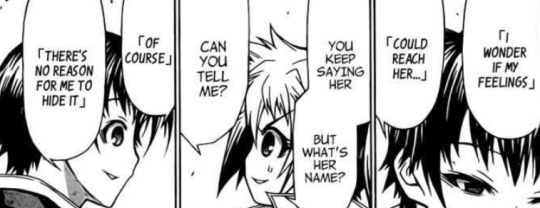
Which is why in the end they’re relationship is so important and formative to one another. They, just like Medaka and Zenkcihi are basically the ones who humanize each other. They make up each other’s identities. But at the same time both of them are so afraid of being humans they go out of their way to dehumanize and destroy each other.
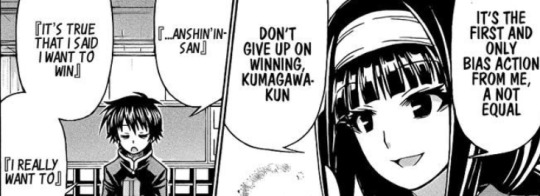
Ajimu even admits this on the final note of their relationship together. That Kumagawa in the end was the only real person to her, the only person she could show any bias towards. That’s why she’s able to hate him and love him, because she actually sees him as a person.
In the same light, Kumagawa only starts to believe it’s possible for him to win when Ajimu tells him he can.

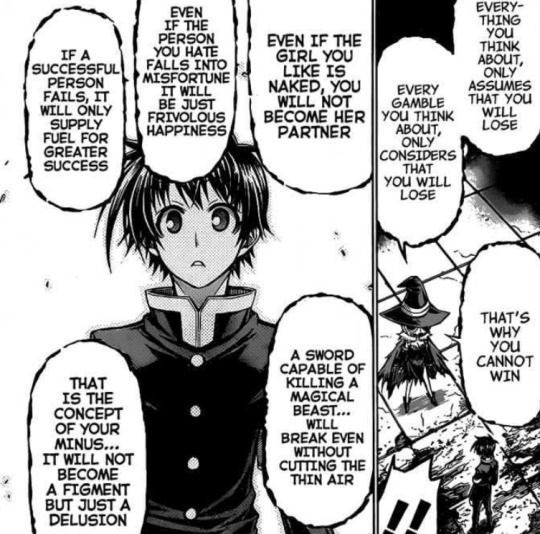
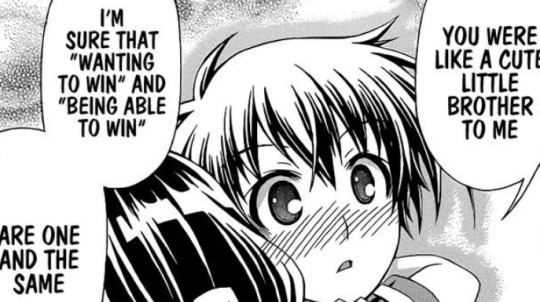
That’s how formative for Kumagawa Ajimu is. He cannot accept the idea that he could win, until Ajimu finally accepted and embraced him as a person.
That’s what it means to be close, you are equally as capable of hurting each other as you are helping each other. That’s why Medaka Box so beautfiully illustrates the power but also the vulnerability of human connection.
83 notes
·
View notes